#provincial silk
Explore tagged Tumblr posts
Text

1 note
·
View note
Text
Archaeology: How Asia’s First Nomadic Empire Broke the Rules of Imperial Expansion
Ancient China’s mobile neighbors built an empire that’s attracting scientific scrutiny

Xiongnu Herders in what’s now Mongolia, portrayed in this painting, followed their own rules in building a multiethnic empire and advancing iron-making technology starting around 2,200 years ago, new studies indicate. Flickr (CC0 1.0)
— By Bruce Bower | July 2, 2023
In an age that spawned the ancient Roman and Egyptian Empires, Mongolia’s Xiongnu Empire broke the rules of imperial expansion.
Long before the Mongol Empire arose, Asia’s first nomadic empire, horse-riding Xiongnu people, conquered ethnic groups across the continent’s northeastern and central expanses (SN: 1/29/10). A common political system headed by Xiongnu imperial rulers formed about 209 B.C. and lasted for roughly 300 years. Unlike in Rome or Egypt, mobile groups of Xiongnu animal herders accomplished this feat without building cities, forming central bureaucracies, devising a writing system or mobilizing masses of farmers to produce food.
Today, remnants of Xiongnu culture largely consist of more than 7,000 tombs, some heavily looted and many yet to be excavated, in Mongolia and nearby parts of China and Russia. In the last decade, geneticists and archaeologists have ramped up efforts to study these sites and ancient records to decipher the Xiongnu Empire’s political organization and technological achievements.

Starting from a heartland in what’s now central Mongolia, the Xiongnu Empire (brown) spread across a large part of northern Asia, taking hold around 2,200 years ago. Naturalearthdata.Com/Wikipedia (CC0 1.0)
A few ancient Chinese chronicles include descriptions of the Xiongnu political system. These accounts portray the Xiongnu as predatory raiders who belonged to a “simple” confederation of herding groups run by a few nomadic alpha males. Even so, warfare with mounted Xiongnu warriors equipped with bows, arrows and metal weapons had inspired Imperial Chinese leaders to construct their Great Wall.
Some researchers have argued that Xiongnu people formed a lesser, “shadow empire” alongside Imperial China. But that view is giving way to a picture of the Xiongnu Empire as a different, not lesser, type of ancient state, says Yale University archaeologist William Honeychurch.
In this view, nomadic Xiongnu elites developed a flexible system of political power that connected mobile groups with different genetic and cultural ancestries spread across extensive grasslands and forests. “Elite lineages were not only an important part of a multiethnic Xiongnu state, but members of these lineages were sent to peripheral areas as part of state integration,” Honeychurch says. One new study, for example, indicates that Xiongnu women from elite lineages in central Mongolia served as “princess” emissaries to the empire’s frontier, assuming political power in distant territories populated by various ethnic groups.
“This must have been an empire organized around moving populations,” says archaeologist Bryan Miller of the University of Michigan in Ann Arbor. “Xiongnu elites were savvy politicians who delegated power to keep the empire together.”
In another recent development, excavations in Central Mongolia point to Xiongnu people as early ironworking innovators whose advances spread to their regional neighbors. These discoveries, and others, highlight the unappreciated complexity and the ongoing mystery of how Xiongnu society worked, researchers say.
The Xiongnu Dispatched Frontier ‘Princesses’
Initial insights into the Xiongnu people’s diverse genetic origins were first published in 2020. DNA extracted from remains of 60 individuals excavated at 27 Xiongnu sites indicated that two genetically distinct populations of Mongolian herders had coalesced to become the Xiongnu people around 2,200 years ago. One population descended from several western Mongolian cultures and the other from a couple of eastern Mongolian cultures.
Additional genetic contributions to the Xiongnu mix then came from farther away, most likely a culture near present-day Ukraine as well as Imperial China, reported archaeogeneticist Choongwon Jeong of Seoul National University in South Korea and colleagues.
Building on those findings, Jeong’s team then examined DNA of 17 individuals from elite and low-status graves at two Mongolian cemeteries on the Xiongnu Empire’s western frontier. Central Mongolia’s Xiongnu heartland lay around 1,200 kilometers to the east.
The six largest and richest tombs contained women whose genetic ancestry traced back to central Mongolia, the scientists reported in April in Science Advances. These women rested in wooden coffins placed in square tombs. Items found in these tombs included gold sun and moon emblems of Xiongnu imperial power, glass beads, silk clothes and Chinese mirrors.

Gold Sun and Moon Emblems of Imperial Xiongnu power were found among other elite items in a woman’s tomb on the western edge of the ancient nomadic empire. DNA evidence indicates the woman was related to ruling families in the empire’s Mongolian heartland. © J. Bayarsaikhan
One woman was buried with horse-riding equipment, a gilded iron belt clasp and a Chinese lacquer cup. These objects have previously been found in graves of male horse-mounted warriors. But such items signal that a deceased person had been powerful, not necessarily a warrior, says Miller, a study coauthor.
Miller and his colleagues suggest that the women had been sent to the frontier to maintain Xiongnu traditions and nurture contacts with Silk Road trade networks (SN: 3/8/17). Preliminary signs of genetic relatedness among individuals interred at one of the cemeteries suggest that some elite Xiongnu “princesses” also cemented power by marrying into local families.
The elite women’s graves were flanked by simple graves of adult men, and of girls and boys ranging from babies to adolescents. These commoners possessed greater genetic diversity than the female big shots. If the men were retainers or servants of female elites, they had come from distant parts of the Xiongnu Empire or possibly beyond, the researchers say.
Male Rulers Were Homebody ‘Princes’
Like these female elites, premier Xiongnu rulers had common roots in central Mongolia while their followers had diverse geographic origins, another team reports in the June Archaeological Research in Asia. But rather than being sent to the far reaches of the empire, these rulers stayed close to home.
Three male nobles interred in large underground tombs at one of the largest Xiongnu cemeteries, Gol Mod 2, spent most or possibly all their lives in the Khanuy Valley where they were buried, say archaeologist Ligang Zhou of Henan Provincial Institute of Cultural Heritage and Archaeology in Zhengzhou, China and colleagues.
Meanwhile, at least four of eight individuals buried in some of the many small satellite graves situated near the nobles’ tombs had spent much of their lives in distant places before settling in or near the Khanuy Valley, measurements of different forms of the element strontium in individuals’ teeth and bones indicate. Diet-related strontium signatures, which vary from one region to another, signal where a person spent early and later parts of their lives.
The identities of those in satellite graves, who were apparently killed to form entourages of followers that accompanied deceased nobles, are unclear. They include children and adults, Zhou says. Some were buried with metal weapons or luxury objects such as jewelry.
Genetic and strontium findings suggest that “Xiongnu political organization in central and western Mongolia was highly similar,” Zhou says. Then, as the empire expanded, rulers in the Xiongnu heartland sent select members of their extended families, such as high-ranking women, to new territories in order to replicate the imperial power structure.
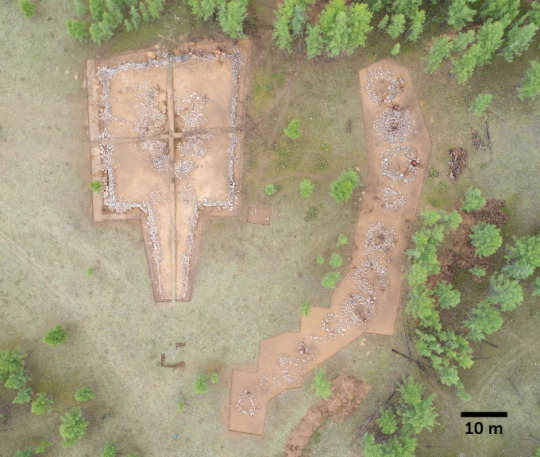
Seen from above, a Xiongnu noble’s tomb, left, lies near a set of small tombs that contained his followers to the afterlife. Xiao Ren, Henan Provincial Institute of Culture Heritage an Archaeology
Iron Innovations Bolstered the Xiongnu Empire
From the start, Xiongnu imperial power depended on a ready supply of iron weapons and other gear that enabled horse-mounted warfare. Researchers who view the Xiongnu Empire as a faint version of Imperial China argue that the nomads’ power depended on importing crops and borrowing iron-making techniques, or simply trading for iron products, from the Chinese.
But new findings suggest that Central Mongolian metallurgists launched a regional boom in iron production around the time the Xiongnu Empire originated, says archaeologist Ursula Brosseder of the University of Bonn in Germany.
At a riverbank site, Brosseder and colleagues have excavated five iron smelting installations that contain by-products of iron making and burned wood. Radiocarbon dates of that material extend to as early as around 2,200 years ago, when the Xiongnu Empire arose.
That makes these finds, each of which consists of two pits connected by a tunnel, the oldest Xiongnu iron smelting kilns by at least 100 years, the researchers reported in March in Asian Archaeology.
Earlier research had established that people living just north of Xiongnu territory in southern Siberia started producing iron as early as around 2,800 years ago. Based on comparisons of finds in the two regions, Xiongnu metallurgists not only learned about iron making from their neighbors but also invented tunnel furnaces, the investigators say. Eastern Asian groups outside the Xiongnu sphere began making and using tunnel furnaces over the next couple of centuries.
Discoveries by Brosseder’s group “show that metallurgy reached the Xiongnu in Mongolia from southern Siberia, not China,” says archaeologist Nikolay Kradin, director of the Institute of History, Archaeology and Ethnology at the Far-Eastern Branch of the Russian Academy of Sciences in Vladivostok. Craftspeople at several iron-making centers, some slightly younger than Brosseder’s discoveries and others yet to be found, must have managed that technological transition, hypothesizes Kradin, who did not participate in the new research.
Brosseder suspects the Mongolian site she’s studied hosted a major iron-making operation. Four iron-making furnaces excavated near the other five have not yet been dated. And ground-based remote sensing equipment has revealed signs of at least 15, and possibly 26, more iron smelting kilns still covered by sediment.
“We can expect more findings of Xiongnu iron smelting centers considering the demand for iron horse gear, arrowheads, carts and other material by the empire’s large army,” Brosseder says.
No reliable estimates exist for the size of that army, or for the overall number of Xiongnu people, says Michigan’s Miller. Xiongnu herders, who also occasionally cultivated a grain called millet, moved across the landscape in relatively small groups that must have been greatly outnumbered by Imperial China’s estimated 60 million citizens.
The Capital Was a Seasonal Seat of Power
In the same valley where Brosseder’s group discovered the oldest known Xiongnu iron smelting kilns, Mongolian researchers have uncovered remains of what was probably a Xiongnu political center, or perhaps even its capital, called Longcheng in 2020. Consistent with everything else about the Xiongnu Empire, “this was a capital of a different kind,” says Miller.
Longcheng excavations so far have focused on a large building that may have hosted important gatherings.
Roof tiles on that structure bear an inscription in ancient Chinese characters that reads “Son of Heaven Chanyu.” Chinese records refer to the supreme Xiongnu ruler as “chanyu.” That royal inscription, the only one found within the Xiongnu realm, identifies Longcheng as a seat of power, Miller says.
Rather than a permanent site, Longcheng, like several excavated Xiongnu villages and walled compounds in central Mongolia, served as a seasonal stopover or temporary meeting place, Miller suspects (SN: 11/15/17). “We don’t know if those other sites were separate political capitals for the Xiongnu,” he says. Top Xiongnu honchos gathered for part of the year at Longcheng before packing up and moving elsewhere, he speculates. Xiongnu herders, regardless of political status, navigated animals to seasonal grazing spots. Staying in one place throughout the year was not an option.
Having a flexible, mobile system of rule appears to have kept the nomadic realm rolling for a few hundred years before the Xiongnu Empire rapidly disintegrated about 1,900 years ago. Why it did so is an enduring mystery. Perhaps the empire succumbed to combined attacks by Imperial China and other groups or, in true nomadic fashion, Xiongnu people reorganized on a smaller scale and moved to safer areas.
Still, “the Xiongnu had created a massive imperial network in Asia,” Miller says. “Their ways of life didn’t go away overnight.” For instance, Xiongnu-mediated trading by groups situated along Central Asia’s Silk Road routes continued despite military defeats in the empire’s central Mongolian heartland. Only further archaeological and genetic discoveries can clarify how Xiongnu people in the imperial core responded to those setbacks.
Whatever happened, Asia’s first nomadic empire can likely be counted on for a few more surprises.
— Science New, July 02, 2023, By Bruce Bower
#Archaeology#Nomedic Empire#Bruce Bower#Xiongnu Herders#Mongolia 🇲🇳#Roman and Egyptian Empires#Xiongnu Empire and Empirial Rulers#Xiongnu Warriors#Chinese Imperial Leaders#Great Wall#Yale University Archaeologist William Honeychurch#Bryan Miller of the University of Michigan in Ann Arbor#Science Advances#Glass Beads Silk Clothes and Chinese Mirrors#Wooden Coffins ⚰️#Square Tombs#Henan Provincial Institute of Cultural Heritage and Archaeology in Zhengzhou China 🇨🇳#Princesses#Nikolay Kradin#Institute of History Archaeology and Ethnology at the Far-Eastern Branch of the Russian Academy of Sciences in Vladivostok#Siberia#Brosseder’s Group#Archaeologist Ursula Brosseder of the University of Bonn Germany 🇩🇪
7 notes
·
View notes
Text
Tw: female reader, obsessive thoughts, nsfw, dub - con (reader is intoxicated), hinted stealthing
I'm thinking about a sweet, shy boyfriend who slowly but surely grows insecure, paranoid and jealous.
At first he's everything you've ever wanted - you're his first girlfriend and he does everything in his power to make you feel loved and appreciated.
As time passes, this doesn't change - he's still treating you like a goddess. But you are both different people now. You mature and you change, you blossom into a more radiant version of yourself. You finally get your dream job. As you gain more experience and wisdom, you begin to realize you want more from life than the small provincial town you've spent your whole life in.
In the beginning he supports you fully - he wants to see you happy after all. But then you start coming home later and later, looking more tired than the day before. Your friend circle broadens, and you spend more and more time outside of your shared home. Before the man knows it, it's Friday evening again and he's passively staring at you while you fix your makeup and adjust the tight dress (his favourite), ready to go to yet another networking event - for the third time this week.
You kiss his cheek, telling him not to wait up, just like that - no sweet words, no reasurrings or tempting promises, nothing he can cling onto in the darkness of your empty bedroom. Your perfume still lingers in the heavy air, making him light - headed. He can't stand it anymore - he buries his face in your pillow, savoring your smell, then he wraps the soft plush around his throbbing length and just thrusts, pathetic broken moans muffled by his own hand. He thinks about your smile and your eyes and the way you say his name and--
Fuck, now your pillow is all dirty again. Your boyfriend can't remember the last time he got to touch you directly. Recently you're always too tired or stressed out when you come back home, and though he's been respectful of your wishes, he's just so pent up at this point - all his dreams consist of you in compromising positions covered in silk and lace and nothing else. Just thinking about it gets him hard all over again.
So this night when you come home drunk and needy, climbing over his lap, he doesn't bulge - doesn't push you off. He doesn't like your new life - having to share you with all those people who don't deserve you, having to stay aside and watch as you give yourself away to people who couldn't care less. He's the one who cares about you so much he's going crazy every second you're apart. He's your real family, he's the only one that should matter to you.
And that night as he fucks you raw for the first time in forever, his cock stretching your velvety walls beyond reason, your blissed out moans and cute little cries tell him exactly what he wants to hear. You're finally letting go, finally allowing yourself to feel safe and protected in his arms. This is your home, this is where you belong. Your body is calling out to him to take control - and he intends to do just that.
#yandere#male yandere#yancore#male yandere x reader#yandere oneshot#yandere male x reader#yandere x you#yandere oc#yandere oc x reader#yandere smut
2K notes
·
View notes
Text
Hundred-Pacer 百步蛇:Design Background
A lot of people seem to really like the Hundred-Pacer set, so I thought I'd do a detailed post on its design background as if I wasn't gonna do that anyway because I need somewhere to spout the nerd stuff you can't stop me.

The Hundred-Pacer is a two-piece Han Dynasty set consisting of a curved-hem robe 曲裾袍 and a waist piece. There were two main inspirations behind this set: the Mawangdui burial site, and the hundred-pacer snake itself, specifically its veneration by several indigenous groups in southern Taiwan.
馬王堆漢墓 / 马王堆汉墓 / Ma3 Wang2 Dui1 Han4 Mu4 / Mawangdui Han Dynasty Tomb

Hunan Provincial Museum exhibition banner. The artifacts from Mawangdui are regarded as national treasures. They have been on permanent exhibition since 2017.
I did a (questionable in accuracy.........) Newhanfu article on the Mawangdui burial site when I was still active there. It’s one of my favorite Hanfu relic dig sites: I learned about it in my early stages of hanfu research, and it was one of the first archaeological sites that I felt sort of a visceral connection to. People often ask why I like hanfu, and I usually answer with a little anecdote—combing through the records of Hunan Provincial Museum, sifting through page after page of data on decaying silk and wooden carvings, it struck me that those figurines looked oddly familiar—their faces looked just like me.
Anyway, it’s a very famous dig site; most Chinese people have at least heard of it even if they aren’t into hanfu. It’s an eerily remarkable feat of preservation that the contents of the tomb were so complete. I’ll do a separate rewrite of that article later, but for now all you need to know is that the tomb belonged to a ~50-year-old Xinzhui Furen / 辛追夫人 (aka Lady Dai) during the beginning of the Eastern Han Dynasty(西漢 / 西汉 / xi1 han4) in the Changsha Kingdom (長沙國 / 长沙国 / chang2 sha1 guo2), who died of a heart attack in 168-169 BCE, and the clothes she was buried with form the basis of our understanding of Han Dynasty clothing as a whole. A number of very well-preserved straight- and curved- hem robes were excavated with her.

褐色菱紋羅地「信期繡」絲綿袍 / 褐色菱纹罗地“信期绣”丝绵袍 / he4 se4 wen2 luo2 di4 xin4 qi2 xiu4 si1 mian2 pao2 / brown lozenge gauze base Xinqi embroidery silk down robe, excavated from the Mawangdui tomb. One of the most well-preserved curved-hem robes from the burial. Length 150cm, wingspan 250cm, sleeve width 28cm, waist 60cm across. The main material is brown silk gauze (luo) woven in a diamond pattern, embroidered all over in the Xinqi embroidery pattern, padded with silk floss. The trim is brocade and the lining is juan silk. The bottom section is bias-cut but not the top section. Src: Hunan Provincial Museum.
The robes excavated fall into two categories: straight-hem and curved-hem robes. All of them were long and cross-collared. Straight-hem robes are your classic floor-length robes, whose hems sweep the floor evenly. Curved-hem robes, or 曲裾袍 / qv1 jv1 pao2, have a hem that spirals up the lower body from the floor, resulting in a 'curved' hem. The resulting structure is an extra triangular piece extending out from the wearer's side that gets wrapped around the waist area and secured with a belt.
Of the eight curved-hem robes excavated, only two have a double-trim border decoration. The most well-known and the usual standard for recreations is the 褐色菱紋羅地「信期繡」絲綿袍 / brown lozenge gauze base Xinqi embroidery silk down robe. The other is the 絳綛紫色「長壽繡」絲綿袍 / dark purple Changshou embroidery silk down robe, but it's less well-preserved so there's less information out there about it; nevertheless it looks to be constructed very similarly. Both of these robes are padded with silk floss and have an embroidered body, with two different colors of taping along the sleeve cuff, collar, and hem: a darker color comprising of the wide taping directly adjacent to the main body and a lighter color comprising of the narrow taping distal to the main body.

絳綛紫色「長壽繡」絲綿袍 / ��紫色“长寿绣”丝绵袍 / jiang4 zi3 se4 chang2 shou4 xiu4 si1 mian2 pao2 / dark purple Changshou embroidery silk down robe, excavated from Mawangdui tomb, length 130cm wingspan 232cm. Very similar to the other robe except with a different embroidery pattern on the surface and slightly less well-preserved at the edges. Src: Hunan Provincial Museum.
The curved-hem robe is a type of shenyi robe. Shenyi are defined as long robes whose torso and bottom sections are separately cut & sewn together, rather than just being a shirt/top that happens to be very long. The top half usually follows the same construction as any Hanfu top, whereas the bottom half is usually made up of 4-12 quadrilaterals pieced together to wrap around the waist and legs. Most shenyi will also have decorative trims along the hem and collar.

Structural line drawing of the curved-hem robe. Reposted by 春梅狐狸 (well-known online hanfu author, wrote 华夏衣���), originally from 长沙马王堆一号汉墓 (official report). Confirmed—corroborated with multiple sources.
Both of the curved-hem robes have a similar shenyi construction, in that we can look at the top and bottom sections separately. The collar is a classic cross-collar (but with a characteristically wide collar piece), cut out in a curved shape. The sleeves are chuihuxiu, ‘drooping’ sleeves, in that they project straight out from the root and then curve upwards at the ends to meet the slightly narrower sleeve cuffs.

The bias grain on a grid representing the fibers that would be woven together to form a piece of fabric. Src: Designer Stitch.
The bottom ‘skirt’ section is made of four bias-cut panels sewn together. 'Bias-cut' refers to the orientation that the pieces are cut out from the full bolt of fabric, in relation to the grain: these panels were positioned so that the fabric grain ran across them diagonally, rather than straight up and down, allowing a non-elastic fabric to soften and stretch (think of a parallelogram being pulled from opposite corners).
This method is a very important feature of the curved-hem robe, because it allows for the bottom section to wrap around the hips and legs much more tightly, resulting in the pronounced, flattering silhouette we see in Han dynasty murals and figurines.

The rearrangement of parallelogram pieces cut out from a pain piece of fabric to extend the length with zero waste. Image reposted by 華服志; I'm not sure where it came from initially but have corroborated with multiple sources that it is accurate.
The trims are also bias-cut, with a no-waste method of extending the length of a strip of fabric by cutting and rearranging parallelogram pieces. I'm sure this has a name, I just don't know what it is. The other robes, gloves, virtually anything that required a long 'strip' of fabric from the tomb employ this same method, simultaneously lengthening and softening the fabric.
Modern recreations will typically follow the same cut & bias as the original pattern while substituting other fabrics. For this set, because of the nature of the trim fabrics and the placement of the design, some parts (especially the narrow trim) were cut traditionally while other parts were bias-cut. The solid body of the skirt section was bias-cut.

彩繪木俑 (Colored Wooden Figurines), Mawangdui #1 Han Tomb, Early Western Han Dynasty ~202BCE—9CE, Src: Hunan Provincial Museum
Additionally, we can also deduce from the depiction of curved-hem robes on figurines that they were floor-length, likely almost dragging on the front. We know that Lady Dai's corpse was about 154cm tall, while her robes were approximately 130-150cm long. Accounting for some shrinkage that likely occurred over time due to water loss, this measurement corroborates the suspected proportions. Both men and women have been depicted wearing curved-hem robes, though later on the majority seem to be women.
Inspiration 1: The Hundred-Pacer & Surrounding Legends

Src: Liu Rui Wei, iNaturalist, Photo 345941307, August 2023, observed near 三星鄉
Looping back around to where the initial idea for this set even came from: When we first started brainstorming for the Year of the Snake collection, one of the first things we decided was that each set would be based on a different species of snake. Yulan, being the ultra biology nerd here, put together a list of visually/culturally interesting snakes for us to start off on. One of those snakes was the Chinese Moccasin or Hundred-Pacer, Deinagkistrodon. I didn't know about its existence before she introduced it to me.

The Hundred-Pacer snake is one of the six great venomous snakes of Taiwan. It's called the Hundred-Pacer because there's a legend that once you've been bitten by one, you'll be dead within a hundred paces. Obviously that's an exaggeration, but the hemotoxin it produces can indeed be fatal. On the flip side, its venom has also ironically been used to make antivenins for a long time.

Src: Shao Qi, iNaturalist, Photo 406124328, July 2024, observed near 新竹
In appearance the hundred-pacer is very striking—the main distinguishing features are its triangular head, sharp pointy snout, and triangular body pattern (diamond-like from above). Lower down, next to the belly, they have a row of small black splotches visible from the side. They're most famous in Taiwan but can be found in many mountainous regions in Southeast Asia and southern China.
Most notably, hundred-pacers are considered sacred to several indigenous groups in southern Taiwan, such as the Paiwan (Paiwan: Kacalisian), Bunun, and Rukai (Rukai: Drekay) people (I was able to find more information on the Paiwan people so most of my research pertains to them). Many of their creation myths have to do with hundred-pacer snakes, and there are several folktales related to hundred-pacer gods. Some consider themselves descendants of hundred-pacers, others say they are protected by them—the Paiwan people call themselves the 'People of the Hundred-Pacer.'



Examples of the hundred-pacer depicted on various items belonging to the Paiwan people. Src: 順益台灣原住民博物館 Shung Ye Museum of Formosan Aborigines, top: scabbard (M015800), bottom left: gunpowder tube (M016100), bottom right: carved figurine (M070000).
In any case, the image of the hundred-pacer appears everywhere—in sculptures, architecture, nobility's clothing (for the Paiwan people, only the noble were permitted to wear the hundred-pacer on their clothing), and infinitely many decorations. It's one of their most prevalent symbols.
From a cultural perspective, this was specifically interesting to me and relevant to the Year of the Snake collection's intent, because it was a counterexample to the theory that snakes are universally considered bad because they are dangerous. Not only do these indigenous groups have an extremely positive view on the snakes, the snakes in question are undeniably very dangerous. To me, this proves that it's possible to have respect for an animal's beauty, not in spite of, but because of its powerful ability to cause damage.
This is already true of a lot of mammalian predators—tigers and lions can certainly be very dangerous, but they're still seen as symbols of strength and power, not met with the same disgust that snakes and similar creepy-crawlies tend to evoke.
Inspiration 2: Taipei Fashion Week

Runway photos from Taipei Fashion Week SS23. The model in the center has hundred-pacers on her arms. Src: The Daily Front Row, "Taipei Fashion Week Returned With A Thought-provoking Theme," 17 October 2022.
Taipei Fashion Week SS23 opened with a show titled “CrossLab: Dialogue Between Indigenous Art and Fashion.” The basic idea was to pair up 5 designers with 5 traditional indigenous craft artisans from various indigenous tribes throughout Taiwan, mixing modern fashion with traditional techniques that are in danger of dying out.
The artisans in question are incredibly well-respected masters of their craft, recognized by the Ministry of Culture as keepers of intangible cultural heritage. Many of them inherited their skills from their families and are now some of the only individuals in the world who still know how to use them. You can read about each designer, artisan, and collaboration in the archives of Taipei Fashion Week's websites. The looks are absolutely GORGEOUS, from the clothing itself to the styling & makeup—like peak couture. I've been obsessed ever since I found out about it.
youtube
I unfortunately do not have the truckload of sponsors and connections necessary to make a collaboration of this scale happen on my own (yet!!!!!!!!), but learning about this event did make me more aware that as cultural artists we have an opportunity to create, explore, and share beyond our comfort zones.
Quick Disclaimer on Culture
While some Taiwanese Han people including myself do have some detectable traces of austronesian blood, for many it’s a percentage so small that it’s virtually negligible. Studies claiming significant overarching genetic difference in the Taiwanese Han population due to indigenous blood have been largely debunked already. I am NOT able to claim indigenous culture as my own.
To be clear, my intention is not to claim these cultural aspects, but to share their existence with the world. If this post sparks interest in anyone, I want to acknowledge that my knowledge basically ends here. If you want to learn more I would encourage looking elsewhere (I will put some links at the end) for a more authentic source of information.
Though I did my best to research accurately and respectfully, information on indigenous peoples is often either not available, of dubious accuracy, or hard to access, especially with a language barrier. Also, historical categorization of Taiwanese aborigines has always been really iffy, so there’s some disagreement about terms and descriptions that complicates things. Colonization happened & continued to happen for a very long time and there are still a lot of issues within Taiwan related to the treatment and status of indigenous people. I only hope that I can continue to pay homage to those less-often recognized cultures that played a role, however large or small, in shaping the world that we live in today, and the identities we wear on our bodies.
I hesitated on this set and this post for a very long time because I didn’t want to offend or overstep, but ultimately I went ahead with it because I think that if people always refuse to interact with or learn about something for fear of doing it wrong, then no efforts will ever be made to spread awareness and understanding about new things. To me, my objective to share these cultural concepts is worth the risk of imperfection. I tried my very best and will continue to revise things as I learn, but if I say something inaccurate, misleading or otherwise offensive, please understand that it’s never my intention, and point me in the right direction (nicely please :<).
The Design


As mentioned before, the cut follows the same construction as the Mawangdui curved-hem robes with some modifications—some parts of the trim were not bias-cut because of the positioning and orientation of the printed pattern. However, most of the other parts of the robe follow the original structure.

The fabric making up the body of the robe is velvet chiffon, an ultra-light and soft fabric with the tiniest hint of a pile. It drapes like a dream and the pile gives it the tiniest bit of that sophisticated velvety sheen on the surface—but only a little; it’s closer to chiffon than velvet. To the best of my knowledge, the fibers are polyester. The color chosen is a deep plum purple shade, taken from the second mentioned robe in the Mawangdui section.
An earlier prototype had the robe lined with a cotton fabric, but there were some issues with it: the cotton lining was noticeably thicker than the chiffon surface material, which affected the drape of the robe as a whole. This might’ve been less of a problem if, like the lined robed found in Mawangdui, they were padded with some kind of cotton or silk floss in between, but we didn’t have that, so the separation between the inner and outer layers looked odd. In the end I elected to remove the lining completely—the wrong face of the velvet chiffon was perfectly smooth and comfortable anyway, and this would allow for some flexibility in climate, since the lined version was very hot.

Src: Photo by 齊玉 (@chiyu1024 on ig), modeled by Tangtang—shot January 2025 at Yangmingshan National Park
The trims on the robe feature two printed designs that I drew, both based off of the hundred-pacer’s diamond /triangle pattern. I wanted the wide trim to resemble the actual color scheme and visual texture of the snake’s scales a little more closely, so I used similar grey-brown colors and a scale brush to create mottled, alternating diamond scales.
One of the features that makes the hundred-pacer’s coloring so noticeable is that the delineation between the light and dark parts isn’t just a single switch of colors—on the dark triangles, the color gradually deepens as you get closer to the line; on the light diamonds, the color lightens close to the border. This emphasizes the shade contrast between them and also gives the illusion that the lighter diamond part is ‘floating’ above the triangles, since the super dark parts of the triangles appear like shadows.

Src: Liu Rui Wei, iNaturalist, Photo 315860941, August 2023, observed near 三星鄉
If you’ve ever painted you’ll be very familiar with what I’m talking about; to strengthen the appearance of an edge you increase the contrast on either side of it to ‘lift’ the brighter side and ‘push’ the darker side down. It’s nature’s very convincing imitation of leaves that have fallen on the ground—as obvious as it seems to us, it works extremely well as camouflage when the ground is littered with brown leaves.


The narrow border’s print has slightly different colors: the background is cream, like the snake’s underbelly, and the pattern itself alternates between dark red and purple. It’s more on the geometric side. One side has wide triangles, as the hundred-pacer’s pattern appears from the side, and the other has half-ovals, meant to imitate the round black splotches lining the edge of its belly. There are circles in between them representing the errant black scales that I’ve seen appear on their necks and bellies, and also to even out the overall appearance a little.

Originally I wanted to narrow border to only have the belly splotch pattern, but when the sample was made it looked a bit strange—the splotches ended up being too big in relation to the diamond pattern, and their unevenness was really pronounced, which I didn’t like. I re-designed the pattern to have smaller shapes scattered throughout, which I think was a lot more visually balanced.

That about wraps it up I think! I'm supposed to get edited photos back from my January photoshoot in Yangmingshan National Park by like... next week or so, I'll do a separate post about it with pretty pictures (this post is already long enough >.<)

hey look it me
Addendum—Sources, Resources, and Ways to Support Formosan Indigenous People
Keep in mind that a lot of these sources are gonna be written in traditional Chinese. Some of them have English translation options on their websites though, you just have to look for it/accept that there's probably gonna be some mistranslations.
順益台灣原住民博物館 / Shung Ye Museum of Formosan Aborigines: Located in Shilin District in Taipei, close to the National Palace Museum, museum dedicated to indigenous peoples of Taiwan. If you ever visit Taipei and have the National Palace Museum on your list I’d recommend carving out some time to come here too! Entry is $5 USD with a bunch of discounts for students/elderly/indigenous/disabled/etc. There are four floors (including basement) to explore and tons of permanent/rotating exhibits.
WilDesign Wildman Workshop: One of the indigenous-owned workshops I like. They’re not super duper active but they make just... really cool stuff. I got a necklace from them.
LiMA: A distribution platform dedicated to indigenous people’s handiwork. They have a physical location in Taipei on Yongkang Street that I visited (I was very shy and chickened out of chatting with the staff but it was VERY cool, it's where I found the Wildman necklace I bought). They’re endorsed by the Council of Indigenous Peoples. They have everything from jewelry to makeup to snacks.
DI NI Handmade Workshop: Another indigenous peoples’ workshop. I haven’t been to this one in person but have heard good things. It’s apparently run by a bunch of retired elementary school teachers, and they’ve got a lot of very cute jewelry, purses, pillowcases etc.
Council of Indigenous People: Council of Indigenous people’s webpage on Paiwan people. They have regular news and info coming out. For some reason the link breaks sometimes, idk why, but if it’s not working you can probably google your way there.
Explore the Sun Qadaw : Another organization, also associated with LiMA. They share stuff about crafts, travel, events, food, etc. I think they have an instagram but idk if they're very active there
I found this random article, I can't figure out where it's from but the info seems to check out with all the other sources????? So I guess I'll put this here too?????
National Taiwan Museum of Fine Arts: This is a past event listing but it contains some information in it about the hundred-pacer and its depictions.
Academia Sinica Center for Digital Cultures: Some more depictions of the snake on carvings.
Taiwan Environmental Information Center: Article on the hundred-pacer legends.
#hanfu#chinese hanfu#chinese fashion#hanyuansu#hanfu fashion#hanfu photoshoot#chinese history#hanfu art#chinese#cloud9 hanfu#cloud9hanfu#九雲閣#long post#han dynasty#quju#mawangdui#indigenous culture#taiwan#formosa#paiwan#year of the snake#fashion#historical fashion#indigenous people#payuan#im trying to figure out how to donate money to the shung ye museum but its confusing bc international bank things x-x
57 notes
·
View notes
Text
Answer to my survey:

It's just a concept image, but with every stroke on my graphics tablet, a story was put together in my head. It's totally mental and has nothing to do with Shigaraki per se, but I feel the need to share this fantasy with you.
Maybe when you look at the picture you have a completely different backstory. Write your thoughts in the comments or reblog✏️ to share your ideas like I’m doing now.
I for one am curious to hear what others think, so please don't be shy and join in 🤗
!!ヽ(゚д゚ヽ)(ノ゚д゚)ノ!!
The legend of Shigaraki, the cursed daimyō
Setting: Feudal Period (Medieval Japan)
This era is characterized by wars between samurai clans, shōgun rule, and Japan's isolation from the rest of the world.
Why this setting? Most myths and legends have their origins in the Middle Ages, which is why I chose this one.
Story
As a baby, Shimura Tenko was nothing more than a shadow in a dying empire - a child of a daimyō (Provincial ruler) with no future, rescued from the flames of war. An allied daimyō took in Tenko and his sister when their father fell to the blade of an enemy daimyō. They grew up in silk and honor, in a family that considered them their own, since the ruler's wife could not bear offspring. Shortly after his arrival, Shimura Tenko was given the name Shigaraki Tomura, heir to a fair clan, a ruling family that watched over their province with a firm hand but a kind heart.
However, his seventeenth summer brought not the rush of young power, but the bitter breath of death. A famine spread across the land like a heavy, invisible curse - fields withered, wells dried up, livestock died. The old prayed, the weak died, and in the dark nights people told stories about the cause of this torment: a Gashadokuro (Japanese demon (yōkai)) - a skeleton made from the bones of the starving, driven by an insatiable hatred for the living.
Tomura went into the forests with his father and his most loyal warriors to drive away the monster. The fight lasted an eternity, and when the daimyō seemed to have defeated the beast, the yōkai struck one last time - his bony claws digging into Tomura's chest and his curse flowing like black ink into his blood. With the last of his strength, the monster breathed out words colder than death itself:
"Wretched people... your kind will suffer as I have and decay will be your downfall."
Tomura survived, but the yōkai's dark poison now pulsed in his veins. The priests of his clan bound his curse with sacred seals, forcing the poisonous force back into the depths of his heart, but the seal was no cure - just a lock on the door to damnation.
When news of the cursed heir reached the Tennō (The official, divine ruler), the emperor was overcome with holy anger. He, a pious ruler, could not tolerate the existence of such tainted blood and ordered the shōgun to remove the scum.
But the Shōgun (the de facto true ruler of Japan) was a pragmatist - he didn't waste a second on supernatural fairy tales. No honorable samurai should risk his life for a superstition. Instead, he bought the services of a horde of Kusa-Musha, outlaw mercenaries who wiped out villages and anointed their blades with blood for a sack of coins.
⚠️🔞 And so they came in the night like wolves waiting for the wind. They set fire to the palace, killed samurai as well as servants and raped the women of the house - Tomura's mother, his sister... No one was spared. 🔞⚠️
In the ruins of the burning ancestral hall, as the icy night sky shook with the screams of the dying and Tomura's father was murdered before his eyes, it happened - the pain, the despair, the burning, inextinguishable hatred broke the chains and the seal broke.
A storm of pure darkness erupted in a single wave of destruction. Tomura's body tore apart with the birth of a new being - no longer human, no longer a mortal creature, but a walking curse. Flesh and bone gave way and the yōkai within him screamed, "Free at last!”
He destroyed everything and spared nothing, neither the murderers of his family nor the few survivors who had called him “Lord” that morning. A massacre that no one would sing about.
When Shigaraki woke up, he was lying on cold stone. His palace was nothing more than a skeleton of charred wood and molten bronze. The halls where his father once ruled are now rubble and dust. The streets - or what was left of them - were covered in ash that settled in his lungs as if it was taking away the last of his humanity.
He glanced at his hands and for a moment he thought they weren't his. Too long, too sharp, too strange. His nails were black, his skin looked like it was made of parchment and was streaked with fine, dark lines.
"The Hand of Decay" he thought, but before the thought was fully formed, a strange, deep voice interrupted him:
"Not the hand of decay... the wings of decay."
The voice was like thunder rumbling in his head, as if the sky itself was speaking to him - it was the yōkai within him.
Shigaraki froze. A shiver ran down his spine, so strange and yet familiar, as if something inside him had been sleeping for centuries and had now opened his eyes. His breathing was heavy, his heart was racing - or maybe it didn't beat at all anymore, maybe it had long since become something else.
Then he felt something, a tingling sensation in his shoulders, a tugging deep in his back - wings.
With a sound somewhere between a gasp and an unnatural crunch, he spread her. Thin, ghostly wings, veined like coarse parchment, as if they had lasted centuries before finding their true form at this moment.
The wind tugged at them as if to carry them away, but they held firm, trembling as a strange heat spread through his veins, making him drunk and burning the truth into his core.
He was no longer human, no longer a daimyō, no longer an heir to any name. He was a beast, a yōkai - a dragon of destruction.
And from that day on his name became a curse. Whispered on dark nights, murmured in prayers for mercy, a shadow over the land that had betrayed him:
Shigaraki, the cursed daimyō - the dragon with the wings of decay.
Basic idea of my kite design
Western Dragon
I deliberately chose a Western dragon design because the Japanese dragon (Ryū - 龍 or 竜) is different from them in many ways. They are often associated with water, storms and divine wisdom, rather than fire and destruction. Their symbolism ranges from protection and prosperity to chaos and divine punishment.
So why did I choose a Western design when a Japanese dragon can also represent chaos and divine punishment? The reason is that I know very little about Japanese culture and am only equipped with Wikipedia knowledge. I don't want to tarnish this or any other culture, so I chose a dragon design that is clearly associated with destruction, chaos and revenge.
Moth: Symbol of transience and death
Moths have a subtle but profound symbolism in Japanese culture. They are less well known than butterflies, but their meaning is often associated with transience, destruction and obsession.
In contrast to butterflies, which often represent rebirth and the soul, moths are seen more as a sign of decay.
Since moths often live in the dark and are attracted to light, they symbolize the longing for something unattainable.
There is a Japanese proverb: 「飛んで火に入る夏の虫」(Tonde hi ni iru natsu no mushi), which meant: "Like a summer insect flying into the fire." It describes someone who brings his own ruin - just like a moth that is drawn to the flame and burns up.
Some Japanese folk beliefs say that the soul of a deceased person can return as a moth to watch over the living or to deliver a message.
In some ancient tales, the moth is associated with Yōkai's and evil spirits that lurk in the dark.
Their “dust”, which remains on the skin when touched, was once considered “poison” or “curse”. It was believed that moths flying into the house at night heralded bad luck or an impending disaster.
My moral supporters
@doumadono | @alexandhisstuff | @unhinged-bratty-boy | @jake-lockley-vengeance | @taco-bee | @grossograsso
I mention accounts that my works 💜️ and 🔁. If someone no longer wishes to be mentioned, please write it.
#bnha#mha#my hero academia#boku no hero academia#league of villains#bnha shigaraki#mha shigaraki#shigaraki fanart#shigaraki tomura#mha tomura#bnha tomura#tomura shiragaki#mha au#bnha au#my hero art#boku no hero fanart#my hero fanart#boku no hero art#lura mha/bnha art#lura mha/bnha dragons
61 notes
·
View notes
Text
[Hanfu · 漢服]Chinese Late Warring States period(475–221 BC) Traditional Clothing Hanfu Based On Based On Chu (state)Historical Artifacts
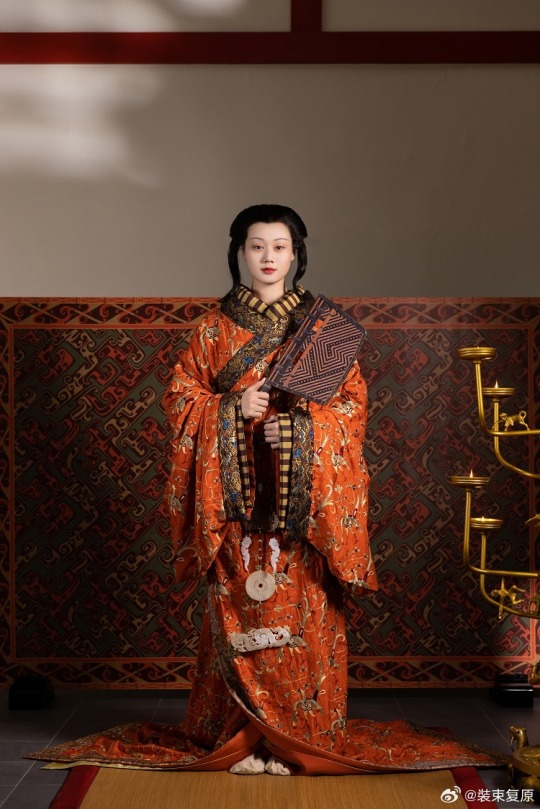
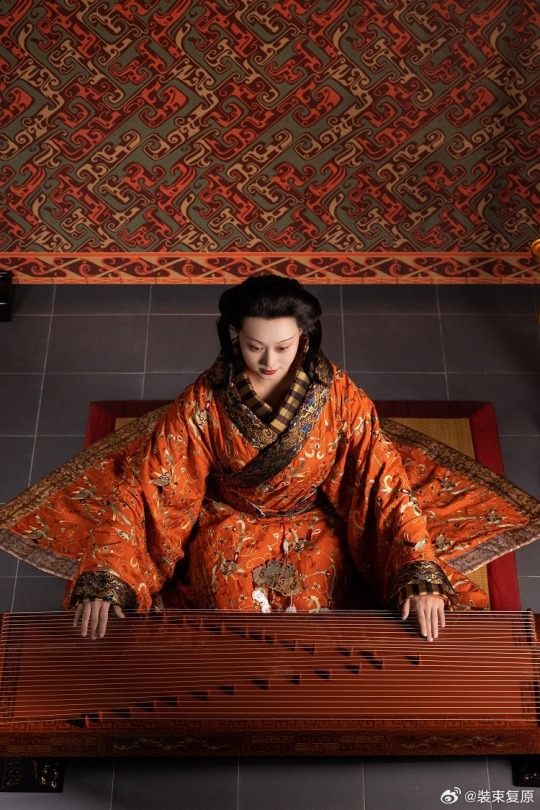
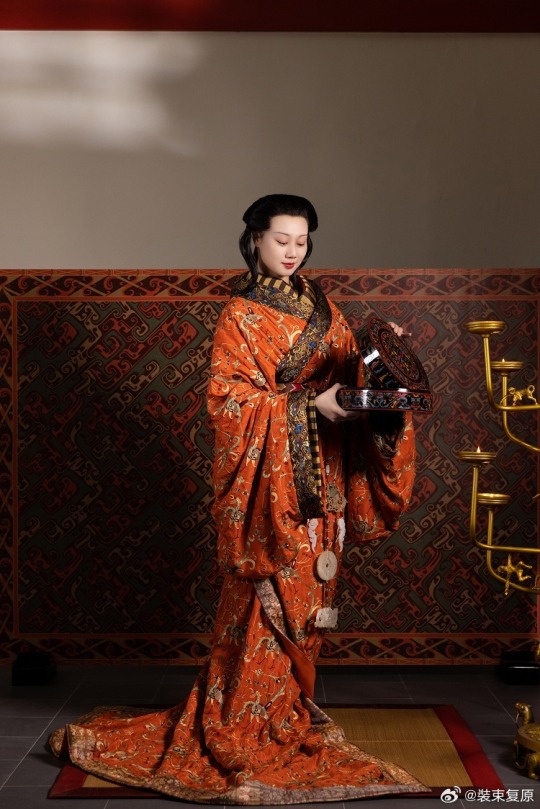
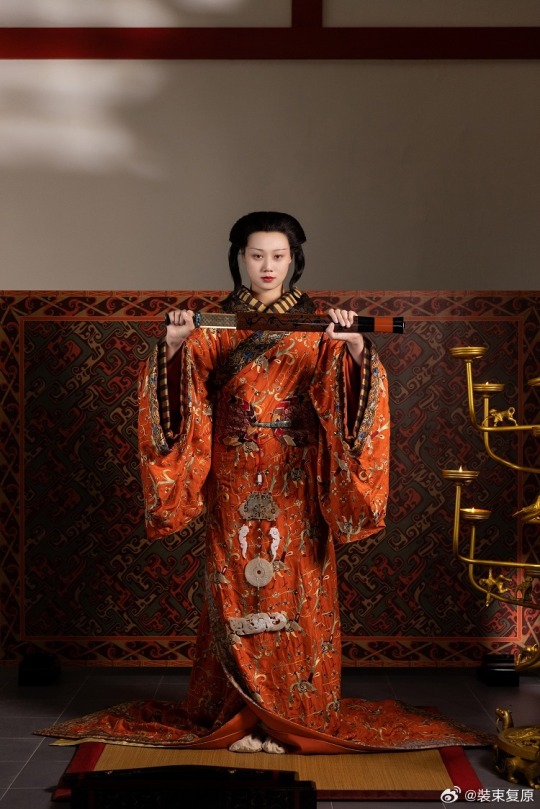
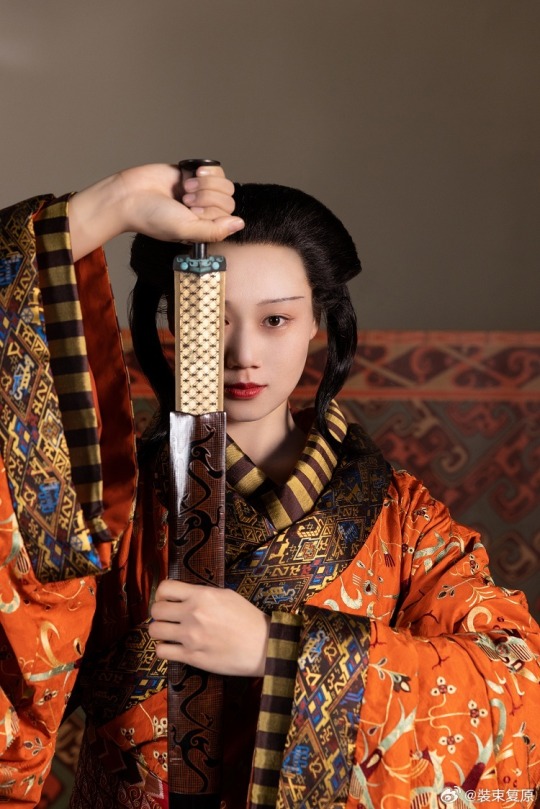
【Historical Artifact Reference】:
Late Warring States period(475–221 BC):Two conjoined jade dancers unearthed from Jincun, Luoyang,collected by Freer Museum of Art
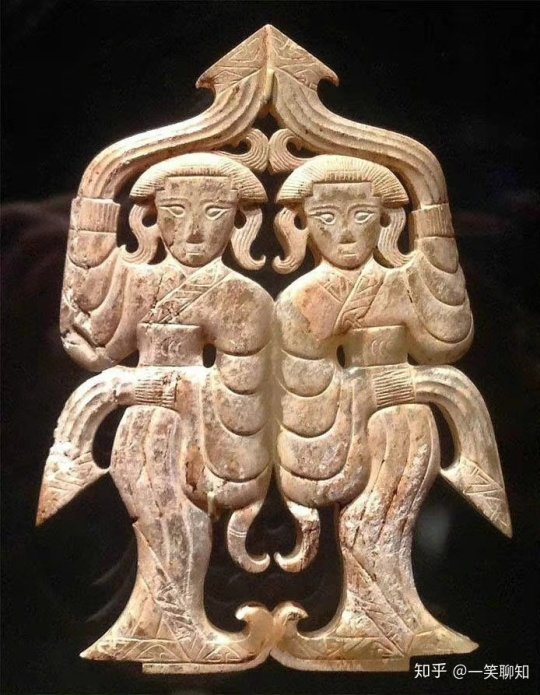
A similar jade dancer was also unearthed from the tomb of Haihunhou, the richest royal family member in the Han Dynasty, and was one of his treasures.
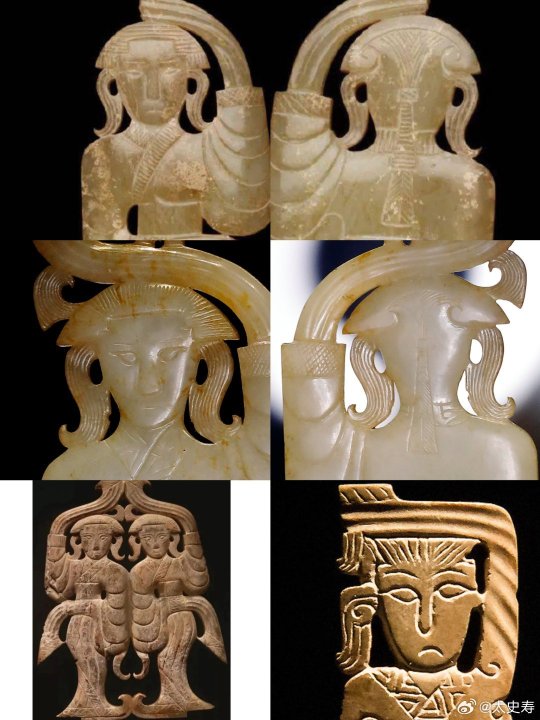
Warring States period, Eastern Zhou dynasty, 475-221 BCE,jade dancer by Freer Gallery of Art Collection.
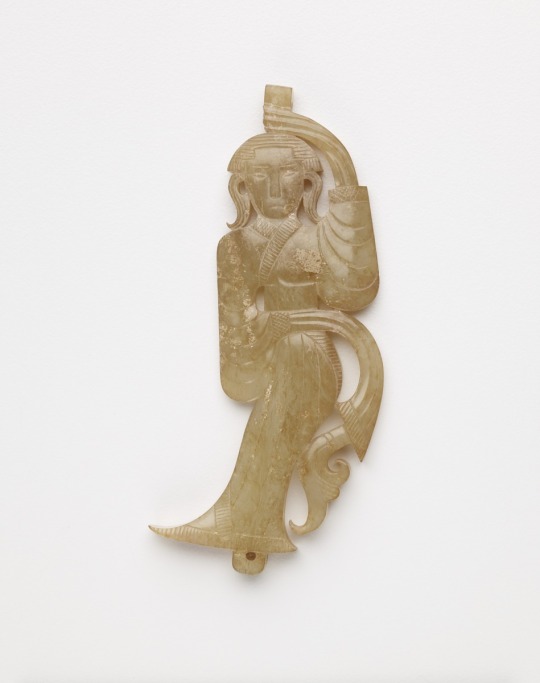
Warring States period(475–221 BC)·Silver Head Figurine Bronze Lamp.Unearthed from the Wangcuo Tomb in Zhongshan state during the Warring States Period and collected by the Hebei Provincial Institute of Cultural Relics and Archaeology
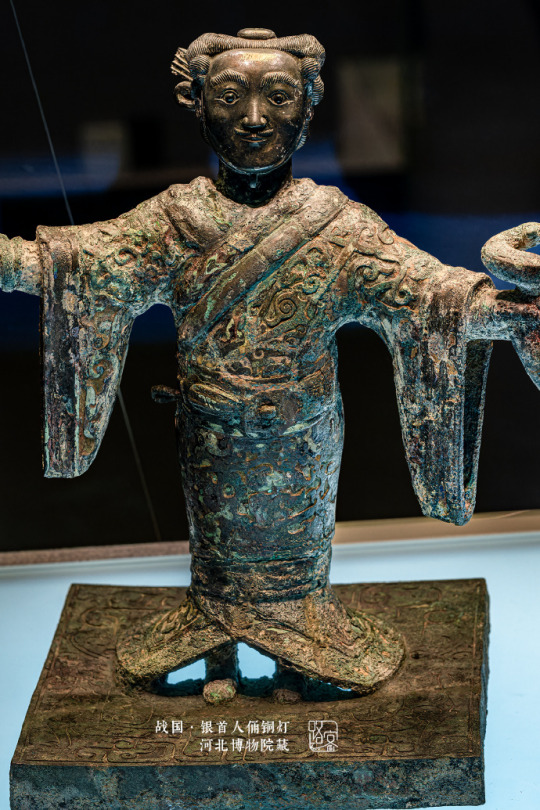
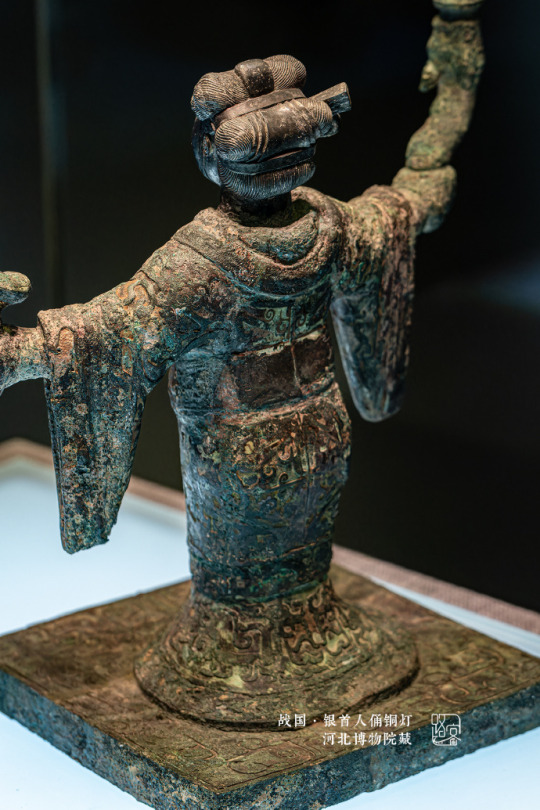
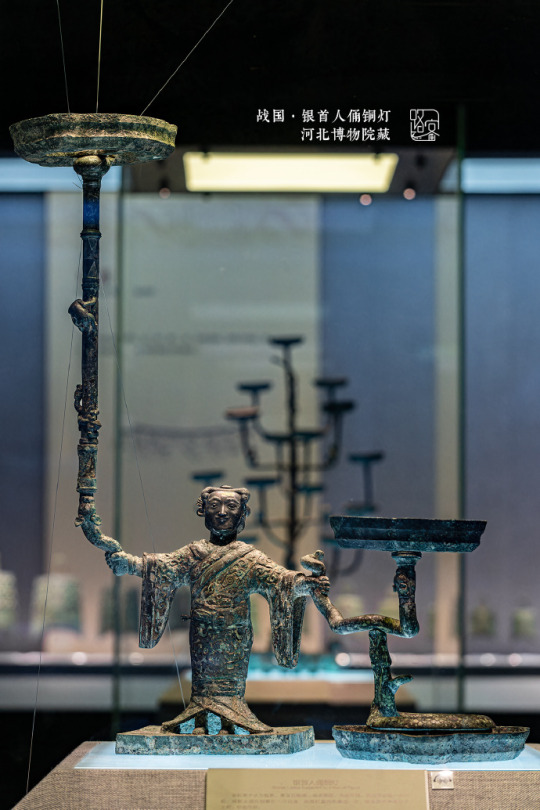
The figurine of a man dressed as a woman holds a snake in his hand, and 3 snakes correspond to 3 lamps.
Sword of Goujian/越王勾践剑:
The Sword of Goujian (Chinese: 越王勾践剑; pinyin: Yuèwáng Gōujiàn jiàn) is a tin bronze sword, renowned for its unusual sharpness, intricate design and resistance to tarnish rarely seen in artifacts of similar age. The sword is generally attributed to Goujian, one of the last kings of Yue during the Spring and Autumn period.
In 1965, the sword was found in an ancient tomb in Hubei. It is currently in the possession of the Hubei Provincial Museum.
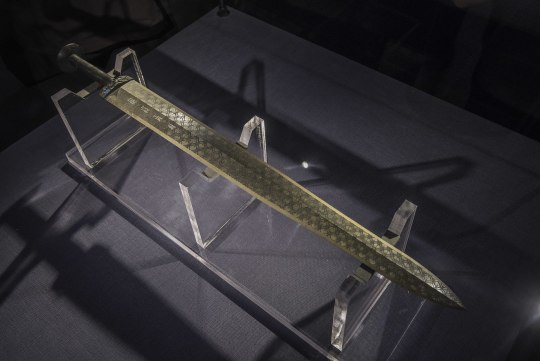
【Histoty Note】Late Warring States Period·Noble Women Fashion
The attire of noblewomen in the late Warring States period, as reconstructed in this collection, is based on a comprehensive examination of garments and textiles unearthed from the Chu Tomb No. 1 at Mashan, Jiangling, as well as other artifacts from the same period.
During the late Warring States period, both noble men and women favored wearing robes that were connected from top to bottom. These garments were predominantly made of gauze, silk, brocade, and satin, with silk edging. From the Chu Tomb No. 1 at Mashan, there were discoveries of robes entirely embroidered or embroidered fragments. The embroidery technique employed was known as "locked stitches," which gave the patterns a three-dimensional, lively appearance, rich in decoration.
The two reconstructed robes in this collection consist of an inner robe made of plain silk with striped silk edging, and an outer robe made of brocade, embroidered with phoenixes and floral patterns, with embroidered satin edging. Following the structural design of clothing found in the Mashan Chu Tomb, rectangular fabric pieces were inserted at the junction of the main body, sleeves, and lower garment of the robe. Additionally, an overlap was made at the front of the main body and the lower garment to enlarge the internal space for better wrapping around the body curves. Furthermore, the waistline of the lower garment was not horizontal but inclined upward at an angle, allowing the lower hem to naturally overlap, forming an "enter" shape, facilitating movement.
The layered edging of the collars and sleeves of both inner and outer robes creates a sense of rhythm, with the two types of brocade patterns complementing each other, resulting in a harmonious effect. Apart from the robes, a wide brocade belt was worn around the waist, fastened with jade buckle hooks, and adorned with jade pendants, presenting an elegant and noble figure.
The reconstructed hairstyle draws inspiration from artifacts such as the jade dancer from the late Warring States period unearthed at the Marquis of Haihun Tomb in Nanchang, and the jade dancer from the Warring States period unearthed at Jin Village in Luoyang. It features a fan-shaped voluminous hairdo on the crown, with curled hair falling on both sides, and braided hair gathered at the back. The Book of Songs, "Xiao Ya: Duren Shi," vividly depicts the flowing curls of noblewomen during that period. Their images of curly-haired figures in long robes were also depicted in jade artifacts and other relics, becoming emblematic artistic representations.
The maturity and richness of clothing art in the late Warring States period were unparalleled in contemporary world civilizations, far beyond imagination. It witnessed the transition of Chinese civilization into the Middle Ages. The creatively styled garments and intricate fabric patterns from the Warring States period carry the unique essence, mysterious imagination, and ultimate romanticism of that era, serving as an endless source of artistic inspiration.
--------
Recreation Work by : @裝束复原
Weibo 🔗:https://weibo.com/1656910125/O6cUMBa1j
--------
#chinese hanfu#Late Warring States Period#Warring States period(475–221 BC)#hanfu#hanfu accessories#chinese traditional clothing#hanfu_challenge#chinese#china#historical#historical fashion#chinese history#china history#漢服#汉服#中華風#裝束复原
283 notes
·
View notes
Text

@gravity-gravy
Czekl territory is a LONGGGGGGG way west. These two regions have nothing to do with each other and no direct/specified knowledge of each other's existence. (There ARE some trade networks that connect these locations, but few goods actually Move that far).

(Note that Czekl is an ethnonym rather than a state/location. 'Czekl lands' here indicates the broad outline of this group's total ethnolinguistic sphere)
((Ignore that the continents have divided since you last saw them))
Most Wardi civilians who live in the major coastal cities will have a good chance of seeing qilik every once in a while. Most qilik here are of Ulelilwa ethnicity (from an island chain at the southern end of the White Sea) and travel here in the process of moving and selling trade goods (mostly spices, silks, feathers, liquor, and dyes). If you're a sailor or dockworker you're pretty much guaranteed to encounter Ulelilwa qilik on a relatively frequent basis. They probably don't speak Wardi and you probably don't speak Ulelilwa, but there's a good chance that both of you know at least some Seaway Burri and can communicate.
A very small minority live there permanently, and an even smaller group are considered legal citizens (citizenship isn't a legal requirement for living here but it is a vital form of social/legal protection and security). The latter tend to be wealthy Ulelilwa merchants, and the former tend to be people who work for them. Some also find work as translators. There is currently one (1) Ulelilwa qilik in the city Jaitse's provincial government who works as a servant-translator and scribe but is also functionally a mid-level tax official.
51 notes
·
View notes
Note
Oi, querida, tudo bem? Adoro a sua escrita e adoro que você escreva para a nossa linda Indra😭😭
Você poderia fazer uma cena obscena em que a Indra está em uma reunião e é interrompida para uma rapidinha?
"Hi dear, what's up? I love your writing and I love that you write for our beautiful Indra😭😭
Could you do an obscene scene where Indra is in a meeting and is interrupted for a quickie?"

The room was dim, cloaked in the warm glow of paper lanterns and the quiet rustle of scrolls.
Advisors sat around the long table, voices clipped and focused, heads bowed over parchment.
Indra sat at the head, posture carved from stone, fingers steepled as he listened—calm, poised, immovable.
Until the door creaked open.
She stepped in like the moon interrupting a storm: silent, uninvited, but impossible to ignore.
She didn’t look at the others.
Only at him.
And he knew.
That look wasn’t unfamiliar.
It wasn’t pleading, either—it never was.
It was a gaze that clung to him like a whisper against the neck.
Heat, need, tension barely veiled behind the practiced softness of her expression.
No words.
She never needed them.
Indra’s eyes narrowed the faintest degree, betraying the shift in him only to those who truly knew how to read him.
No one in this room did.
–Sit here.– he said, his voice smooth and low as he pulled the chair beside him just slightly back.
She obeyed quietly, robes rustling like silk against a blade, and took her place at his side.
The meeting continued, voices drone-like, discussing territories, reinforcements, border activity.
Indra barely blinked.
His hand moved with the same certainty he used to wield a weapon.
Unhurried.
Unseen.
Slipping beneath the edge of her sleeve first, as though the gesture was accidental—brushing knuckles along the inside of her wrist.
She inhaled.
Lightly. Barely audible.
To anyone else, it would look like nothing at all.
But his hand didn’t stop.
It glided further, purposeful and calm, vanishing beneath the folds of her robe, under the table where no gaze reached.
His fingers traced the edge of silk, the vulnerable heat of skin beneath it, all the while keeping his expression unreadable.
She shifted—only a breath—but the way her hand clutched her own knee told him everything.
Her lashes lowered, eyes fixed on nothing, like she was lost in thought.
Only he knew what storm brewed beneath that surface.
He never looked at her, not once.
His face remained a mask of composure as he addressed one of the generals, as if he wasn’t unraveling her slowly with fingers that moved like shadows.
She sat in silence, knees pressed together, trembling just enough that it would take an intimate eye to notice.
And he—unbothered, untouched, controlled to the last detail—merely tilted his head and said:
–Continue.
No one noticed her knees part ever so slightly.
No one saw the color blooming beneath her skin.
No one understood the way she exhaled like she’d been held captive for hours, only now released.
Except him.
And that was enough.
The meeting stretched into its second hour—talks of provincial lines, of grain distribution, of names that held no weight in her ears.
Her world had narrowed to sensation, and the man beside her was its only axis.
Indra hadn’t looked at her once.
He didn’t need to.
His fingers moved with a precision that was infuriatingly slow.
Not rushed, not insistent.
He mapped her like he was learning her for the first time—cruel, because he already knew every part of her.
And still, he explored as if rediscovering the route to her undoing.
A single fingertip had slipped between the part of her robes and undergarments, lingered on the hollow of her thigh, the heat of it sinking into her.
Not quite there.
Not quite enough.
Just presence. Teasing.
The meeting continued.
She swallowed hard, fingers tightening around the edge of her seat, knuckles pale beneath her sleeve.
Indra shifted slightly in his seat, pretending to reach for a scroll with one hand.
The other—still hidden beneath the table—descended just a breath lower.
The back of his fingers brushed the seam where her legs pressed together, where fabric barely concealed the ache building beneath.
He paused.
As though listening to the report of a merchant.
Then moved again.
His fingers ghosted along the inner line of her thigh, slow and dry at first. Just a rhythm, rhythmic and maddening.
Then, as if deciding she’d waited long enough, he slid further into the warmth of her folds, silk and undergarments still in the way.
There, he found what he always did: heat, softness, wetness that bloomed beneath the slightest pressure.
He didn’t touch her outright.
He rubbed the fabric of her under-robe against her, barely moving—back and forth, slow and deliberate—until the friction was unbearable.
Until her breath caught in her throat, lashes fluttering low.
Still he spoke, clean and composed, his voice cutting into the room like any other day.
–We’ll adjust the route along the southern path. Prepare the numbers.
He curled his fingers just enough, finally pushing that barrier aside.
Flesh met flesh.
Wet and wanting.
The pads of his fingers moved with precise intent—rubbing slow, so achingly slow against her pussy, dragging every motion until her thighs trembled beneath the table.
A whimper rose in her throat, and she smothered it behind her teeth.
But it wasn’t enough.
A soft gasp escaped her lips, high and barely audible—yet the silence that followed made it thunder.
Eyes turned.
Several men blinked toward her, puzzled.
And Indra—without removing his hand, without even turning to look at her—tilted his head and asked, with all the cold elegance of a man untouched by indulgence:
–Are you all right, my dear?
Her lips parted.
Her throat was dry.
She nodded, weakly, the lie thin and trembling.
–Yes...– she managed, eyes burning with shame and something deeper.
Indra finally turned to her, gaze unreadable.
But his fingers never left her, still moving, still pressing her closer to the edge with all the indifference of a man sipping tea during a storm.
No one asked again.
And the meeting went on.
#naruto shippuden#naruto#naruto imagines#uchiha clan#indra otsutsuki#otsutsuki indra#indra#indra otsutsuki x reader#otsutsuki indra x reader#indra x reader
15 notes
·
View notes
Note
richie PLEASE tell me about han dynasty mummies
!!!!!! BET OK!!!! <33 gonna teach yall abt Xīn Zhuī who is over 2000 years old!! ok so Xīn Zhuī was found in 1971 at the Mawangdui archaeological site in Changsha! She was found while a team was digging for a new air raid shelter for a nearby hospital but instead they discovered three tombs! The first and largest being Xīn Zhuī's, the second was her husbands Lì Cāng, and the third was (potentially) their son who we dont know the name of. Xīn's tomb by far is the best preserved out of the three and youll see the condition of her and her grave goods soon! (just as a general tw for everyone, theres going to be pictures of deceased people and in depth discussions regarding her state both peri and post mortem here so if you dont want to see that id advise scrolling <3) with that out of the way, onwards! So like i said she was the best preserved of the 3, for reasons were still a little unsure on! It could have been the depth at which she was buried, luck, or the unknown liquid that coated the bottom of her tomb (more on that later)

(picture by Gary Todd) so this is a photo of her tomb and her maybe sons tomb! (for some reason they didnt want to include her husbands which is mildly annoying but anyways) you can see how much further down she was buried in comparison here, but also just how large her burial chamber was, and itll make sense why in a second, but first, more on this specific method of burial and how they were structured! All three tombs at Mawangdui are rectangular in shape and located at the very bottom of a steep vertical shaft as you can see in the image above. When these tombs were constructed, there would have been beams made from cypress planks, that would have been fitted together snugly. Then clay and dirt were layered around the tombs and packed firmly, to help insulate them and protect the tombs. This type of burial actually does not originate with the Han Dynasty, but instead came to be during the Zhou Dynasty. Each burial chamber found had the tomb of the deceased placed directly in the middle, in a series of nesting coffins, with their grave goods placed around the deceased individual in separate chambers. And god did Xīn have A LOT of grave goods. Here is an image of her tomb, undisturbed. You can see, her tomb is placed squarely in the middle, with her grave goods on the sides!

(Unknown Photographer) She was discovered with a total of 1,400 grave goods inside her tomb! ranging from funerary items, to aid her in the afterlife (called míngqì) to items for everyday use such as furniture, toiletries, silk clothing, and dishware! additional fun fact about the dishware recovered, it actually contains one of the earliest found sets of chopsticks!

(Hunan Provincial Museum) and finally the third set of items were all foodstuffs for banquets such as meat, vegetables, fruit and grains. (of which i was not able to find pictures of)
ok onto the final part which is actual care and preparation of the deceased so if you dont want to see human remains now is the time to click off this post <3 So like i said she was buried in a set of four nesting coffins!
So the outermost layer was a plain, unadorned wooden box which is still fascinating and quite frankly is slept on as wood very rarely survives to the modern day! Also an important note to make is its possible that this wooden box was at some point painted like her other three coffins are (youll see in a second what i mean, theyre beautiful!) but paint is another thing that sadly does not tend to survive for very long, so its rarely seen in archaeological finds and since this was the outermost box, its possible it just got worn away with time.

(Hunan Provincial Museum) these are the other three coffins! so the one on the left was the second layer, the one in the center the third, and the one all the way to the right is the one she was actually buried in. You can see the beautiful painting work i mentioned here! Some close up shots of the outer layer!


(Hunan Provincial Museum) So this layer depicts her souls journey to the afterlife, the world of immortals! Whats interesting is since Xīn was from Southern Han, she would have most likely believed that humans had not one but two souls (a fairly common belief around the world actually! such as the norse believing your soul was made up of four parts but this isnt about them right now maybe a post for another time <3) Their belief states that the souls two parts are hún and pò. Hún is the part of the soul which makes the dangerous journey to the afterlife, while pò stays within the tomb, which is why theyre buried with so many items! These items were meant to be used by the deceased's pò. Coffin number 2!

(Hunan Provincial Museum) This red coffin depicts many animals thought to be protectors of the deceased's hún for its long and arduous journey to the afterlife , animals such as dragons, tigers and deer. Beneath the dragons, there appears to be figures of the immortals in dance. Coffin number 3!

This is the final coffin, the one in which she was laid to rest in. It was painted in solid black paint with a silk banner laid on top.

(Hunan Provincial Museum) This silk banner actually depicts a continuous narrative of Xīn's death and funeral, her trip to the afterlife, and then her arrival. Some details of the tapestry <3

This tapestry also shows potential depictions of the famous Chinese myth of Archer Yì and his wife Cháng’é, as well as a potential depiction of Nǔwā at the top, the Goddess of Creation. Now Xīn's body is where things get a little bit odd! So she was tightly and carefully wrapped in 20 (!) layers of damask silk, which was then tied with 9 silk ribbons! Her body was also submerged in 21 gallons of an unknown, slight acidic liquid which tested very high for magnesium! a scrap of the silk recovered

(Hunan Provincial Museum) Now when they removed her from her tomb, people were shocked at how well preserved she was! An autopsy and scans were performed and revealed that there was still blood inside of her veins, and that her skin was soft and her limbs could still be bent at the joints with ease. Her hair and tongue are also still completely intact! Unfortunately as soon as she was unearthed, she began to decompose with the introduction of oxygen, so her current state isnt how she looked pre excavation.



Due to the remarkable condition shes in, we were able to tell a lot about her peri mortem! We know she had gallbladder disease. But this isnt what killed her. Due to the presence of blood in her veins, scientists were able to see clots that formed during a heart attack, meaning this was likely her cause of death. She also had extremely high levels of lead and mercury present in her system, as well as melon seeds in her stomach, suggesting this was her final meal. Today, Xīn Zhuī is resting in the Hunan Museum, alongside her grave goods. You can still visit the site today where she was excavated.
#thank you so much for the ask bia!! <3#i really do love yapping about mummies so this was a wonderful ask to receive <3#filletedfennysnake#bia 🐅 🌲#archaeology#chinese history#tw death#tw mummies#Xīn Zhuī#bioarchaeology#beep beep richie
11 notes
·
View notes
Photo

The Journeys of Paul the Apostle
The journeys of Paul the Apostle, as the New Testament relates in the Book of Acts, started with his conversion experience on the way to Damascus, after which instead of seeking to thwart the growing Christian movement, he helped spread it. His four journeys by land and sea across great lengths of the Mediterranean and over vast expanses of land in Asia and Europe totaled over an estimated 16,000 km (10,000 mi).
The Journeys of Paul the Apostle, c. 55 CE
Simeon Netchev (CC BY-NC-ND)
Paul's First Missionary Journey
After persecution in Jerusalem, Antioch was one of the places to which Christians fled, and it was from there Paul began his first missionary journey. Annexed by Pompey the Great in 64 CE and made the Roman provincial capital of Syria, with an estimated population of 250,000, Antioch was one of the primary cities of the East, along with Alexandria and Constantinople. Located at the northeast end of the Mediterranean on the Persian Royal Road, Antioch benefited from its location at the end of the Silk Road and its proximity to Greece, Anatolia, and Italy. As Hughs and Jones mention, not only was "its wealth derived from being a center of civil, military, and later ecclesiastical administration of much of the Near East but also from its position on the commercial road from Asia to the Mediterranean" (103).
Besides its own wine and olive oil production and as a center for the fulling of cloth products, silk from China, lapis lazuli from Afghanistan, dye-works from the Levant, and weaved silk from Damascus could all have found their way through Antioch for distribution throughout the northern Mediterranean areas. As it lay on the Orontes River and at the edge of a fertile plain, Antioch communicated commercially with the harbor of Seleucia 26 km (16 mi) downstream on the Mediterranean. As common travelers in ancient times hitched their rides on merchant vessels, the water portion of Paul's trip was aboard a cargo ship performing trade transactions. Thus, it was at Seleucia that Paul boarded a cargo ship to the province of Asia, stopping at the island of Cyprus.
Cyprus, with a prominent location at the eastern end of the Mediterranean, was also known for its wine and olive oil production. A scenario for trade would have been a combination of Eastern goods loaded alongside refined and agricultural products accumulated at Antioch. Then, with a stop at Cyprus for partial distribution, Cyprus' products would have been added for final distribution in Asia.
With fellow evangelist Barnabas and Barnabas' nephew, John Mark, Paul first landed at Salamis on the eastern end of Cyprus after leaving the port city of Seleucia and sailing west toward Asia. Like with many of his subsequent stops, Paul first visited the local synagogue, attempting a conversion of the Jews to Christianity. From Salamis, heading west, walking nearly the length of Cyprus, Paul and Barnabas came to Paphos, their point of departure for Asia. At Paphos, the proconsul Sergius Paulus would become a convert.
Paul the Apostle's First Missionary Journey (c. 46-48 CE)
Simeon Netchev (CC BY-NC-ND)
Heading to Asia from Cyprus, Paul's ship stopped at Perga in Pamphylia, in southwestern Turkey today. From Perga, John Mark departed for Jerusalem as Paul and Barnabas pressed on into Asia. At their first stop in Antioch of Pisidia, at the synagogue, Paul preached the history of Israel as he weaved in the story of John the Baptist and Jesus of Nazareth, said to be a descendant of David, as the resurrected Savior, son of God. Though Paul and Barnabas initially gained Jewish and Gentile converts, a faction of opposing Jews expelled them from the city.
At Iconium, with similarly mixed results on learning of a plot to kill them, Paul went on to Lystra. As many in Lystra were worshipers of gods and their idols, Paul preached they should turn from worshiping "things" to worshiping the "living God" (Acts 14:15). When some hostile Jews came from Antioch and Iconium and won the crowd over, both groups stoned Paul. Thinking he was dead, they dragged Paul to the outskirts of the city. When some brethren came to retrieve the body, remarkably Paul had recovered and went back into town. The next day, Paul traveled east for Derbe. With his mission ending on a more positive note, large numbers rallied at Derbe to Paul's message. Deciding to head home, retracing their steps through Lystra, Iconium, and Antioch, after appointing elders in each church, the apostles went on to Perga; then, after preaching there a bit, they boarded a ship for a short junket west to the port city of Attallia, then from there they sailed back to Seleucia, then traveled up along the Orontes to Antioch.
Continue reading...
17 notes
·
View notes
Text
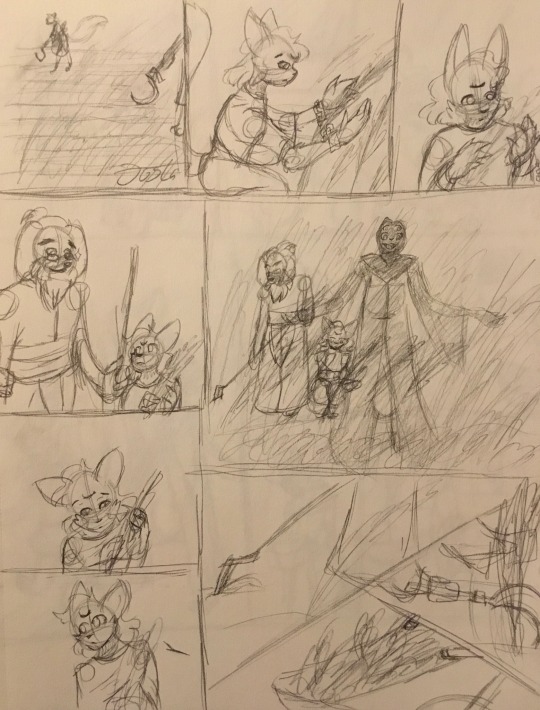
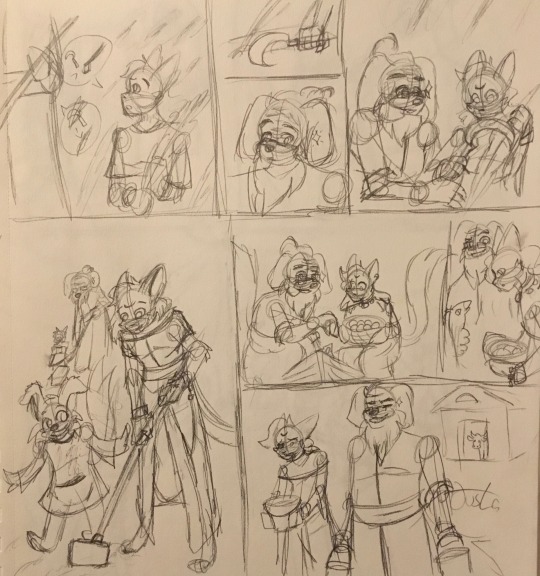
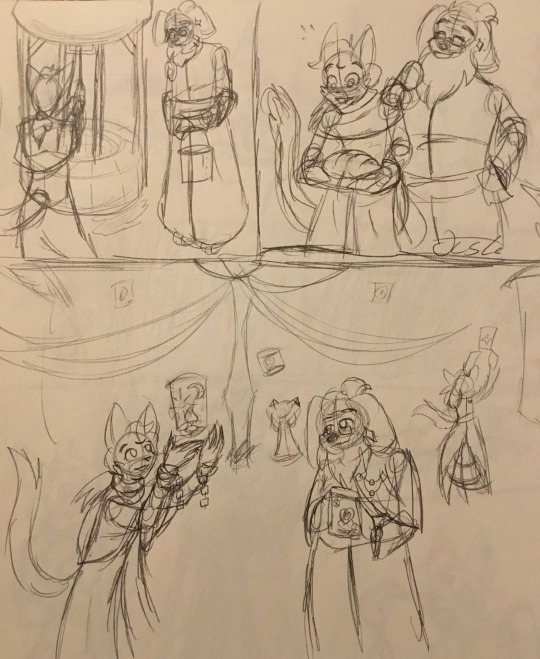
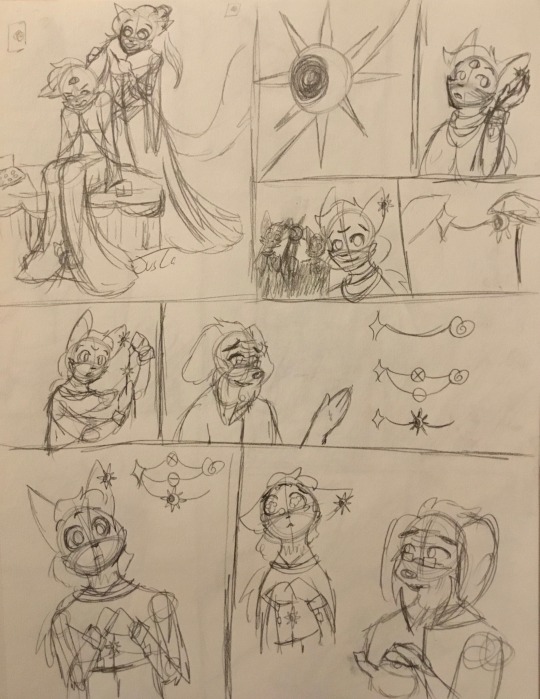
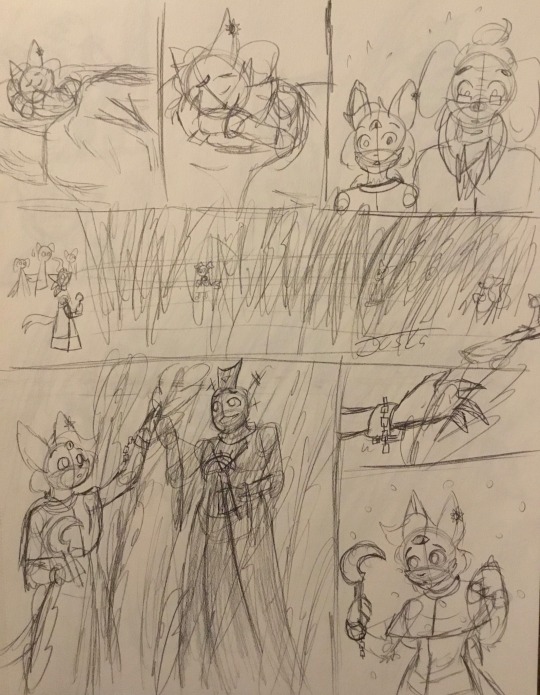
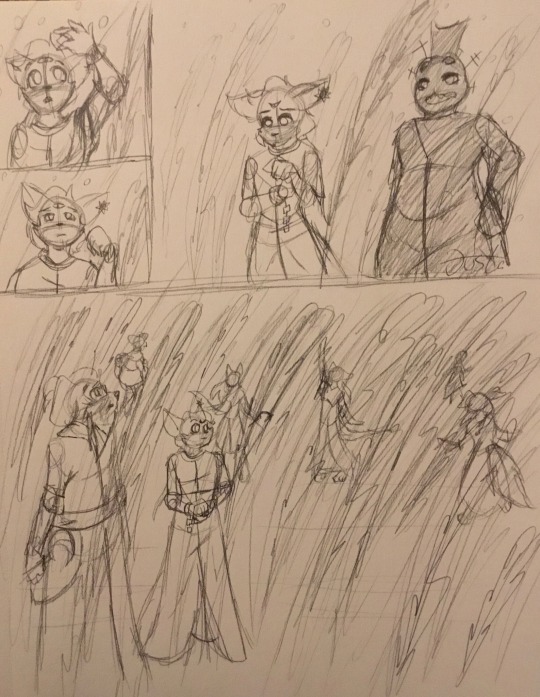
Part 1 | Part 2 | Part 3 | Part 4 | Part 5 [END]
The second shackle comes off
Get adopted and feel loved, mangey cat
We're gonna pretend I didn't give Heket the wrong shaped crown aight? aught 👍
(explanation beneath the cut bc I didn't want dialogue)
The harvest comes. Narinder can't help but notice how sad the wheat fields are, the wheat growing small and patchy at best. He remembers how Heket would make the wheat fields flourish just by walking between the stalks. The memory of the fields she would create early in their godhood makes him feel somber, realizing now what the cost of being a godless land is; their entire lives are left to the limitations of the earth, without any god to help them thrive. These people are making the best of what they have, and they're happy even though it's not a lot.
Narinder notices some are harvesting wheat while others till the earth once it's been harvested, and the old dog explains that once this wheat is harvested they plant "winter wheat", which can be harvested in the spring before they plant their summer wheat. They till and fertilize the earth before planting the winter wheat, of course. Narinder tries his hand at harvesting the wheat, and the old dog begins to teach him how to use the sickle. Time passes.
Over the late summer, autumn and winter, Narinder learns how to live this provincial, modest life. He tills the fields with the other villagers, he sees feral beasts for the first time in over a thousand years, learns to collect eggs from said feral beasts, learns how and decides he doesn't like to collect milk (the godless lands have more feral beasts than the Lands of the Old Faith ever did), has finally regained enough strength to draw water from the village well without help, learns to bake bread (with great amounts of help so as to not waste the precious resources with the inevitable first fifty failures), and attends his first lantern festival. All in all, this marks his approach to his second year here, most of his first year spent indoors recovering. (His fur is also getting long, something something new me new hair something (totally not an excuse for me to draw hair))
At his first lantern festival, Narinder decides to partake in what is usually a coming of age tradition for the village; he gets an ear piercing, choosing a symbol that will essentially act as his written name. He chooses a symbol that is a crescent moon inside of a sun, thinking of Aym and Baal when he sees it. (Note: He is not scared/nervous about the ear piercing, he isn't bothered by a literal pinprick of pain, but the fact that someone he barely knows is this close with a needle is what worries him)
Later on, days or even weeks later, the old dog gives him a chain with their individual symbols on it, with a loose chain hanging from the other side of Narinder's sun-and-moon charm. Narinder questions this and the old dog explains the symbolism behind the charms; two charms with a chain extending between them indicates marriage/partnership, and two charms with another charm on the chain between them indicates that couple's child/children. The one Narinder has is the latter, with the second parent's charm missing, indicating that the old dog views Narinder as his own son, now. It takes a moment, but Narinder realizes all at once that this is the old dog's way of extending an invitation to become family- and it's been so long since Narinder had a family... (And yes, the old dog is fully aware that this cat is thousands of years old (Narinder was very vocal about this in the first weeks before he eventually stopped bringing it up), but that won't stop him from deciding he's gonna be this abandoned, fallen god's new family)
Narinder goes to sleep, and finds that despite everything- despite how simple and quaint and, frankly, not easy life in this little godless village is, he's happy. He has none of the luxuries that he had as a Bishop; no worship, no reverence, no servants, no silks or satins or veils or anything of the sort. Here he's just... one of the people. Just another face in the crowd. And he's happy. Happier than he's been in a long time. Unfortunately for Narinder, he is failing to realize that this godless village is a little less godless every day he's there. But that's not necessarily a bad thing.
The village wakes up to their fields flourishing like they never have before. The wheat is taller than the tallest villager, and no one is really sure what to do about this, but there is excitement throughout the village. Narinder thinks of Heket again, reminded once more how she would make the fields come alive. The shackle on his left hand opens up before dispersing into light, and he remembers the way she looked at him in the days leading up to his imprisonment, the quiet and somber warnings she would give him. He takes a moment to grieve before turning his attention back to the present, back to the family he's creating now.
#cult of the lamb#justa arts#sketch#cotl au#God in a Godless Land AU#Narinder#cotl ocs#I'll name that old dog one day I love him#wip#<- technically#if only bc once I finish all the... 'prequel' parts ig I want to digitize it#still have Kallamar's shackle and then Narinder coming to peace with Shamura (tho there is no shackle for them)#so at least two more parts#but I want to draw more for this AU even after the prequel/prologue is done ehehe#I just like the idea of Narinder finding peace in a simple life#and not even realizing that he's essentially becoming the village's resident god and accidentally blessing stuff#just the idea of Narinder coming to love something that once upon a time he'd have looked at with scorn and probably destroy....#the strength and power that once would have been used to crusade now being used to protect.....#new lease on life babeyyy he's gonna become so gosh darn protective of this village y'all it won't be funny (but will be wholesome)#also just to clarify Heket is NOT actually here even as a ghost as she is in superhe- I mean purgatory rn#they are echoes of a memory (just like Leshy was) that Narinder is recalling#he has no idea that they're in Purgatory and assumes they've moved onto the Afterlife by now
35 notes
·
View notes
Text
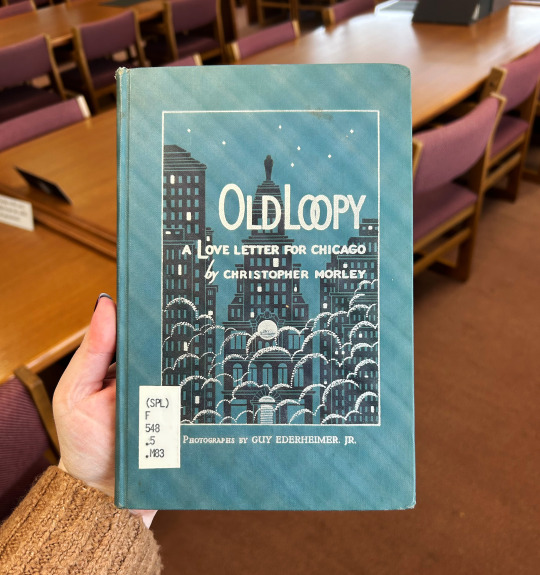
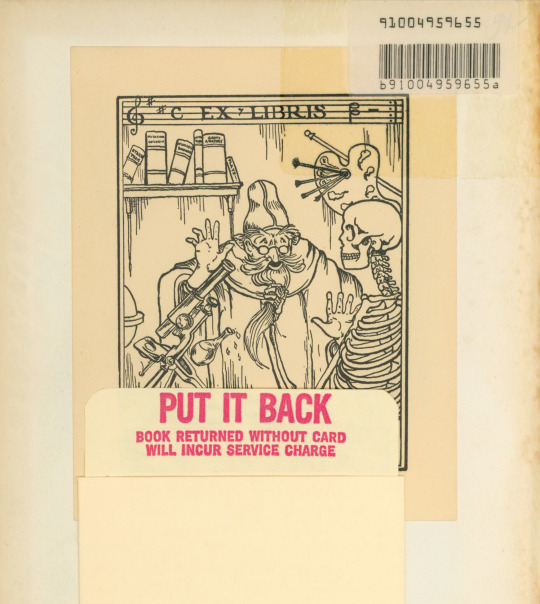


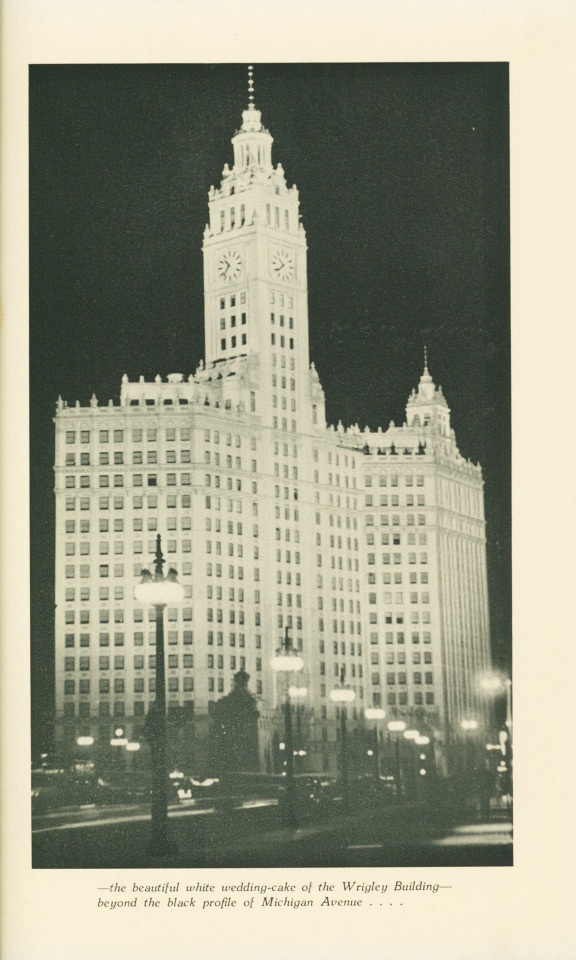


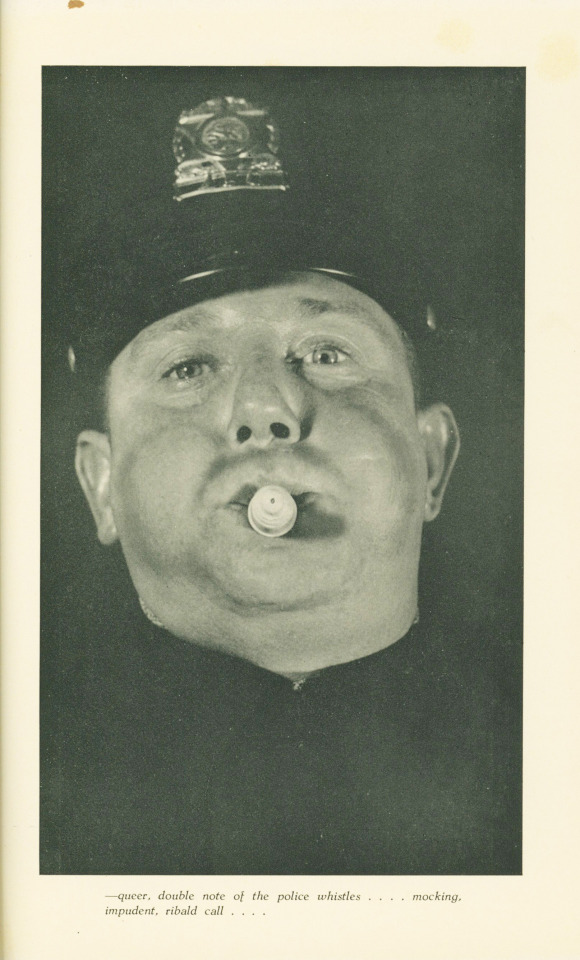
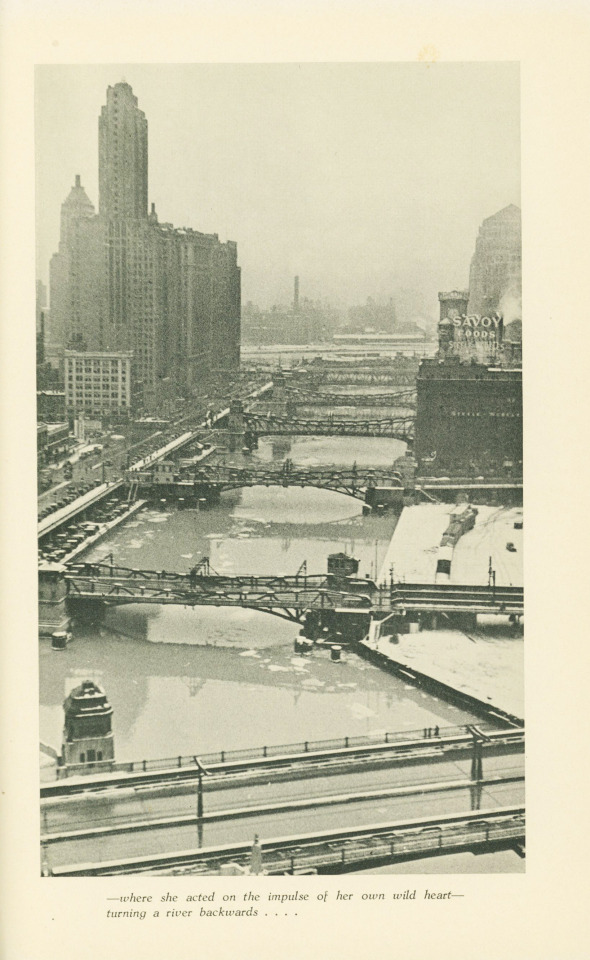
Staff Pick of the Week
I was in the stacks pulling another book when the title of this little book caught my eye—Old Loopy: A Love Letter for Chicago was written by American journalist, essayist, poet, and novelist Christopher Morley (1890-1957) and published in 1935 by The Argus Book Shop, Inc. in Chicago, IL. Morley was a New York man himself, but had a soft spot for the windy city, writing on the first page of the book that even "Here, in my own supreme hometown, I had a yen for old Loopy."
The book is very much a love letter to Chicago as is noted in the title, and Morley truly just waxes poetic about the city for 17 pages. On page 7 he opines:
"It is not my wish nor ability to offer a philosophic essay on Chicago. I simply want to tell her I love her. She is one of the few big towns that can be loved as an integer; a subtle unity holds her together, makes her apprehensible. It is partly her essentially provincial spirit; the deep inferiority complex which is so valuable to the artist, goading him to excess, both achievement and despair; and it is partly some underlying vein of rank vitality. The wild onion for which she was named (most Chicagoans have forgotten this) is an accurate symbol. An exquisite garlic of paradox is still discernible in her doings."
Half flattery and half slight, Morley continues, saying "Her curiosity is enormous, but it is social rather than intellectual" and that "In her bewildering charm intellect plays little part." He also compares the Loop to a noose, calls Chicago "unruly at heart" and "more than a little goofy," and finishes by decreeing that "She spikes the small beer of living with the pure alcohol of the impossible." Well, at least a little bit of that sounds good... I think.
Old Loopy contains ten photographs of Chicago by American photographer Guy Ederheimer, Jr. It also has a delightful bookplate from the library of we-don't-know-whom that features a man of many intellectual pursuits being interrupted by death. We wish we could see the whole thing, but unfortunately this book used to be in the circulating collection and has a library pocket glued over the bookplate. The cover is what I believe to be silk, with diagonal lines and diamond shapes visible when you move it as seen here.
-- Alice, Special Collections Department Manager
50 notes
·
View notes
Text
first day as a small-town provincial chancellor! new year, new me! haha really learned from my previous experience. i am NOT going ditch town in the middle of my term and wander the countryside as a wanted fugitive! this time, if a corrupt inspector comes asking for bribes, i'm just gonna report him like a normal person. i will NOT drag him into the street and flog him in front of a cheering crowd, no matter how much that uppity bastard had it coming. gotta be the bigger man here. also, blood is so hard to get out of hand-painted silk and the new laundry lady scares me :/
update: wow, this place is so poor and run-down and there's bandits everywhere. really reminds me of home. not much happened today, I mostly did some on-boarding for my new staff and played a bunch of icebreakers. during lunch, i had everyone sit together and eat out of the same pot. some of the high-ranking men got pissy about sitting on the same level as their subordinates, but i pointed out that i used to be a mat weaver, so if their new chancellor could make mats for a living, they could damn well learn to sit together on one.
second day as a small-town provincial chancellor and i spent the day meeting my constituents. man, i feel stupid for being nervous, these guys are actually chill as and even though they were all landed gentry of wealth and status, none of them were bothered by the fact i was just a simple military man who couldn't read or write so good. in fact, my new friend Mr Liu is sending me a secretary tomorrow! what a legend!
third day as a small-town provincial chancellor and ngl my new secretary kinda sucks. the poor guy was SO nervous he barely even talked to me and kept making spelling mistakes, so now there's bamboo shavings everywhere. i decided to invited him home for dinner to show him there's no hard feelings and im just a regular bloke. i thought it was going pretty well, but halfway through the meal, he suddenly throws down the chopsticks, falls to his knees, and confesses that he isn't a actually a secretary. he was an assassin who was sent by Mr Liu to kill me, but he couldn't bring himself to do it because i was so nice to him. and then he just??? gets up and leaves???? and i was like '...ok thanks man, good to know' because how the everloving fuck do you respond to something like that???? what the actual fuck????
update: it's past midnight and i am honestly so fucking upset right now. i can't believe Mr Liu would do this to me. i have a BIG council meeting tomorrow, who the FUCK is going to help me take notes now???????
17 notes
·
View notes
Text
Tenor Tom Burke as Mario singing an aria from Act II Puccini's opera 'Tosca'.
How pit lad Thomas Burke, ‘The Lancashire Caruso’, conquered the world but died in obscurity.
By Alan Whittaker
Few people today have heard of the tenor known as the Lancashire Caruso. But at his peak Tom Burke enthralled discerning opera audiences at La Scala in Milan and New York’s Met.
Although he was comparatively unknown in Britain, Dame Nellie Melba, one of the era’s great divas and a woman of formidable authority, heard him sing in Italy and insisted he appear as Rodolfo opposite her in a 1919 production of La Boheme at Covent Garden – a performance that earned him four encores at the end of Act One.
‘At last an English tenor with a voice of pure Italian flavour,’ enthused one critic.
Away from the opera circuit his lyrical voice and vibrant personality endeared him to packed provincial theatres in Britain who delighted in his repertoire of sentimental Irish songs and popular Edwardian drawing-room ballads such as The Minstrel Boy, Killarney, The Mountains of Mourne, Roses of Picardy, Mary, Because, Smoke Gets in Your Eyes, and You Are My Heart’s Delight. He was billed as The Minstrel Boy.
Tom’s career was as dramatic and turbulent as any opera storyline, and in the space of 20 tumultuous years he enjoyed wealth, fame and the favours of many beautiful women, only to sink into penniless obscurity as a barman in a golf club.
Tom’s early recordings are now rarities; crackling, scratchy remnants of the Celluloid Age of cylinders – as distant as the Jurassic Age from modern recording studios with their sophisticated electronic gadgetry.
But there is no mistaking the quality of the voice first heard at the coal face of a colliery entertaining fellow miners; the feeble yellow glow of helmet lamps for footlights and a huddled audience of intensely respectful coal-streaked faces sipping cold tea from tin cups, a mile underground and four miles from the pit shaft.
It was a voice that years later, when Burke was an international celebrity, intrigued King George V, not the most mentally athletic or artistically inclined monarch in Europe. After seeing Burke perform the King decided he would like to meet the singer. It was a command, not a request.
Tom’s response was not the most courteous or diplomatic. “Tell the old bugger to wait,” he told the hapless royal emissary.
It was a stupid throw-away gesture but typical of Burke who carried an invisible coal wagon of smouldering contempt and loathing for the wealthy toffs from privileged backgrounds who seemed to control the destinies of working class people without ever working or making any contribution to society or caring about the plight of poor families.
It was an attitude carved into his character from bitter childhood memories. Tom was born in 1890 and brought up in the Lancashire pit town of Leigh, the eldest of nine children of an impoverished Irish miner. Like so many of his generation, memories of his childhood, often in relentless poverty, left an indelible scar that refused to heal. Bread and margarine as a meal, no milk for a pot of tea, slum housing in Mather Lane, four children in one bed, scavenging for coal on slag heaps during the pit strikes, the queue of disconsolate decent people at the charity soup kitchen and the sight of his mother Mary patching piles of second hand clothes by candlelight. Even in ‘good times’ meat was a luxury reserved for Sunday lunch.
It was a scandalous scenario all too familiar to hundreds of poor families but light years from Sandringham or Balmoral.
As a small boy, Tom acquired a love of singing from his father, Vince, who would sit him on his knee and sing Irish lullabies. He left school aged 12 and after a year working FULL TIME in a silk mill, he became a coal miner, joined Leigh Brass Band and learned to play the cornet. But singing was his greatest pleasure.
Vince and Mary were loving parents and with two wages now coming in decided to buy a second-hand piano. Mary pawned her precious sewing machine to help pay the weekly instalments.
It was a four-mile walk from the pit head to Mather Lane and by chance a music teacher heard Tom singing as he made his way home with a group of fellow miners. He liked what he heard and was instrumental in sending the 17-year-old to a singing teacher in nearby Atherton, who suggested Tom should enrol at Manchester College of Music.
To raise the tuition fees, Tom sold tripe in pubs, entertained customers by singing, and worked as a waiter. When he was 19 he walked from Leigh to Blackpool to hear the world-renowned tenor Enrico Caruso sing at the Winter Gardens. It was a wearying round hike of some 60 miles but it inspired young Burke to dream of becoming a professional singer.
He auditioned for the Halle Choir but was rejected by the musical director as ‘too ordinary’. The orchestra’s conductor thought differently and arranged for Tom to sing for London impresario Hugo Gorelitz, who was in Manchester searching for talented vocalists. He reckoned the raw young lad from Lancashire showed promise and after an audition Tom was given a contract, told to enrol at the Royal Academy of Music in London, and pay his fees by singing at various venues selected by Gorelitz. His voice coach was Edgardo Levi and he persuaded his friend Caruso, who had popped into the Academy for a chat, to listen to his pupil.
Whether Caruso was genuinely impressed or merely humouring an old friend is not clear but over a warm hand clasp he told the wide-eyed Burke: “One day you will wear my mantle, but first you must go to Italy. There you will find your voice.”
Burke took his advice and headed for Italy with his young wife Marie, who came from a well-to-do show business family. In Milan he learned the language, lost his flat Lancashire dialect, sang in several opera houses and once stepped in as a substitute for Gigli, the world famous tenor.
The Great War of 1914-18 saw Tom back in London and ready for military service but the Army authorities decided he would be far better employed entertaining the troops than slogging it out in the infantry.
Following his appearance opposite Melba at Covent Garden he made 14 records for Columbia and during the next decade became the toast of London society.
He appeared at Covent Garden in 1920, with Beecham conducting, and the composer Giacomo Puccini, who heard him at rehearsal, was so impressed he insisted Tom be given roles in two more of his operas. It seemed as though the world was at his feet for that same year he was offered £400 a performance – the highest offer ever made to a British singer – to appear in America. He and Marie set sail for New York.
Then the wheels came off. His agent had advertised him in the States as ‘Ireland’s greatest ever tenor’ – not the smartest publicity stunt when John McCormack was around, delighting packed theatres, and proving the nostalgic voice of Home to every Irish exile in America. It was the equivalent of attempting to pass off George Formby as the new Elvis.
The critics were unanimous and venomous. “John McCormack can sleep easily,” wrote one. There were concerts in small theatres but the £400 a night flow dried up and Marie, an accomplished singer, returned to England to raise cash. She appeared in the London stage production of Showboat with the incomparable Paul Robeson. But Tom’s philandering had strained the marriage and they were divorced.
Left to his wayward ways, Tom regularly made the headlines with his drinking and womanising. There had to be questions about his judgement. Would any sensible person pick a quarrel over a pretty girl with Jack Dempsey, the undisputed ex-world heavyweight boxing champion who was known as the Manassa Mauler? Or cross a Mafia boss in a dispute involving another woman; an altercation that left Burke in hospital with a gunshot wound and a compelling urge to get out of town?
A surprise offer to return to Britain with an engagement at Manchester’s Free Trade Hall with John Barbirolli conducting was gratefully seized. He couldn’t quit America too soon and left the next day leaving a pile of debt.
Back home he visited Leigh where he was given a rapturous welcome by the adoring mining community that spawned him, but London and the bright lights beckoned. He sang to a packed Albert Hall and toured the country enchanting provincial theatre-goers. It seemed The Minstrel Boy was back in business; his American experience an unfortunate hiccup. He could afford a flat in the West End, a Rolls-Royce and a butler.
But the self-destructive streak was never far from the surface. He quarrelled with Barbirolli, agents and impresarios, and even slated the people who queued at Covent Garden to hear him perform. “They are not music lovers,” he sneered. “They go to opera because it’s the thing to do, rather like appearing at Royal Ascot. Just showing off.”
His philandering lifestyle – revolving around booze, broken promises, and attractive women – made him unreliable and on many occasions he failed to turn up for singing engagements. As a result he was shunned by agents and theatre managers and earned nothing for a year. He was an outcast.
Worse was to follow. He lost £100,000 – an enormous amount at the time – in the Wall Street Crash and in 1932 was bankrupt. By 1934 he was renting a tiny threadbare room; a washed-up, disgruntled has-been. The man who had taken Covent Garden by storm became a bookies’ runner, steward at a golf club, and a waiter.
He tried running a club in Leigh but a police raid and charges of illegal drinking forced its closure and Tom moved to Sutton, Surrey, where in 1969 he died aged 78.
A selection of the recordings he made during the 1930s with film of him entertaining soldiers wounded in the Great War can be found on YouTube including Puccini’s soaring Nessun Dorma, a rigorous test for even the most talented tenor. Tom’s version would have pleased the composer.
He is buried in the cemetery at Wallington, Surrey, and the inscription on his headstone reads: ‘Never have I heard my music so beautifully sung’- Puccini.
The glitzy, costumed world of grand opera may no longer remember the Minstrel Boy but for some time after his death a group of admirers in workaday Leigh would meet occasionally to play his records and, over a few beers, talk with pride about the local lad who became The Minstrel Boy and the Lancashire Caruso.
#classical music#opera#music history#bel canto#composer#classical composer#aria#classical studies#maestro#chest voice#Tom Burke#Thomas Burke#tenor#Giacomo Puccini#Tosca#musician#musicians#classical musician#classical history#history of music#historian of music#Royal Opera House#Covent Garden#La Scala#Met#metropolitan opera#The Minstrel Boy#the Lancashire Caruso#footage
5 notes
·
View notes
Text

DISNEY PRINCESS AESTHETICS Bold what applies. Italicize what sometimes applies.Repost don’t Reblog.
i. SNOW WHITE. a cottage in the woods. humming while they clean. trusting too easily. wishing wells. lips as red as blood. seeing monsters in the shadows. the smell of freshly baked pies. blood red apples. childlike innocence. birds chirping. seeing the good. building friendships. laughter in the garden. getting lost in the woods. laughter among friends.
ii. CINDERELLA. clock striking midnight. dancing in the moonlight. delicate heels. grand entrances. pumpkins. high-ceilinged ballrooms. courage. kindness. sweet smiles. soap bubbles. satin gloves. lavender blue. crystal chandeliers. grace under pressure. running down the stairs. losing their shoes. dramatic confessions. rags to riches. strength through humiliation. dreaming of freedom.
iii. AURORA. soft kisses. grace and beauty. true love’s kiss. seraphic song. romance. flowers in their hair. spinning wheels. long naps. rose petals. fairies. a dreamer. dancing barefoot. collecting berries. jewel eyes. love at first sight. soft femininity. the sound of rain against a windowpane. befriending forest animals. the prick of thorns. secret meetings. falling in love with strangers.
iv. ARIEL. collecting seashells. saltwater. the ocean breeze. defiance. carriage rides. sun kissed skin. waves splashing at your heels. adding to their collections. fish out of water. losing their voice. stumbling on their own two feet. the youngest child. restless tides. chasing their dreams. secrets coming out. sacrificing everything for the one they love. the sea breeze ruffling their hair.
v. BELLE. head stuck in a book. a stolen rose. seeing the beauty in all things. horseback riding. dreaming of more. provincial towns. grand ballrooms. adventure. inventive mind. freshly baked bread. warm eyes. pressing flowers between book pages. shakespeare’s sonnets. powder blue ribbons. loose tendrils framing your face. chipped teacups. sunny cafes. the rustle of pages. breathless pleas for more time.
vi. JASMINE. sneaking out. disguises. magic carpet rides. kisses on the balcony. midnight strolls. rich fabrics on skin. silk flowers. taking a leap of faith. basking in the sunlight. lounging felines. the ache of loneliness. magic carpet rides. releasing doves. travelling the world. golden palaces. sapphires. lavish celebrations. expensive tastes. living a life of privilege.
3 notes
·
View notes
Text
15 questions for 15 mutuals
Thank you for marking me, I enjoyed reading all the answers to this list so much! @kestrelteens @kayleigh-83
Are you named after anyone? My parents only called me that because it wasn't a popular name in the 90s
When was the last time you cried? In February, when my friend left. In fact, I cry very rarely because I have problems with experiencing deep emotions. When I really cried, it was probably February\March of last year. For obvious reasons.
Do you have kids? No, but I'd like to one day. I feel too young to have children yet
Do you use sarcasm a lot? Not very. Usually it annoys me if I think that the interlocutor is saying something stupid and then I use sarcasm. Otherwise, I rather prefer to talk directly about my irritability.
What’s the first thing you notice about other people? Clothing and accessories. One day when I was approaching the place of the date, I thought, "Oh my God, I hope it's not him in that ugly hat"
Eye colour? I just found out it's called Hazel. Most of my friends think that I have brown eyes, but in fact it's just dark green. I myself thought for a long time that I had brown eyes, until I found out that this was impossible for genetic reasons in biology class. Lol.
Scary movies or happy endings? In fact, I really don't like horror movies, as I am extremely nervous, but paradoxically I like Stephen King horror books, I also like to watch reviews of scary games, and at one time I also read a lot of SCP. And some of my favorites are La Favorite and Spencer. But I also like TV series, for example, Sexual Education, The Handmaid's Tale, Euphoria And a lot of animated series
Any special talents? I can push my shoulder out of the joint and move my eye asymmetrically (but this is very dangerous because it occurs due to excessive blood pressure in the eyes and head). Also, I'm never late even if I'm late. For some reason, it always happens that I come before everyone else.
Where were you born? Russia, in a small provincial town of Samara. (A million and a half is a small town?) This city used to be a pirate bay, then a fortress, then a merchant hub on the Silk Road, and therefore the city center is located near the Volga River and a beautiful long beach is a 5-minute walk away. Sometimes I think it looks like Miami, but with beautiful wooden architecture of the XIX century
What are your hobbies? My hobby is art and it encompasses too many areas ranging from crafts and Craft and Art, and ending with the study of the latest fields of art. My professional activity is contemporary art, but I also draw, knit, embroider, sculpt, 3D model and much more. Now I'm finishing sewing another blanket, until recently I completely made my room, I redid some furniture, I really like to change spaces. I also like baking and now I have my own garden and I love messing with plants so much! But I don't perceive it as gardening, for me it's performative practices. And of course I really love sims and now I play sims 4 too much. A very important addition, I completely forgot to write about the TAROT. I started studying tarot since Halloween, but in general I have always been engaged in magical practices
Do you have any pets? No, I like to communicate with animals and I've always wanted to get a cat, but now I understand that this is a very big responsibility
How tall are you? 182 cm, quite tall and thin
Fave subject in school? I never liked school, but I liked Social Studies, Biology, World Culture and Art. At the university it was Art History, Psychology and Painting
Dream job? Don't work. I burned out a lot after working at the museum and could not start a new job for 5 months. I would just like to please you with Sims content and get enough money for a living from it. Now I work remotely and I am most comfortable that now I can wake up, take a laptop and, lying in bed, perform work tasks without communicating with people. Sometimes I feel so bad that it turned out to be the optimal format for me, so as not to overexert myself. I would like to tag all the English-speaking bloggers I subscribe to, so feel free to tag me. @lowedeus @greatcheesecakepersona @jellymeduza @alexbgd @lamare-sims
29 notes
·
View notes